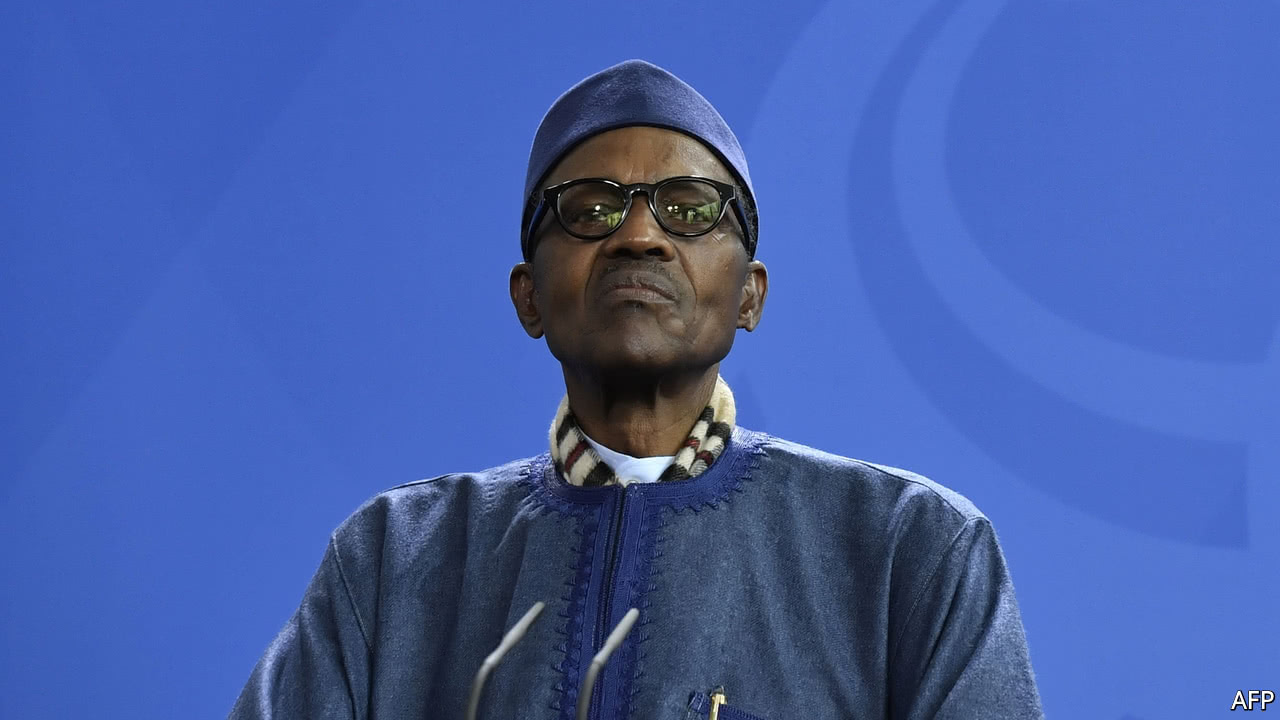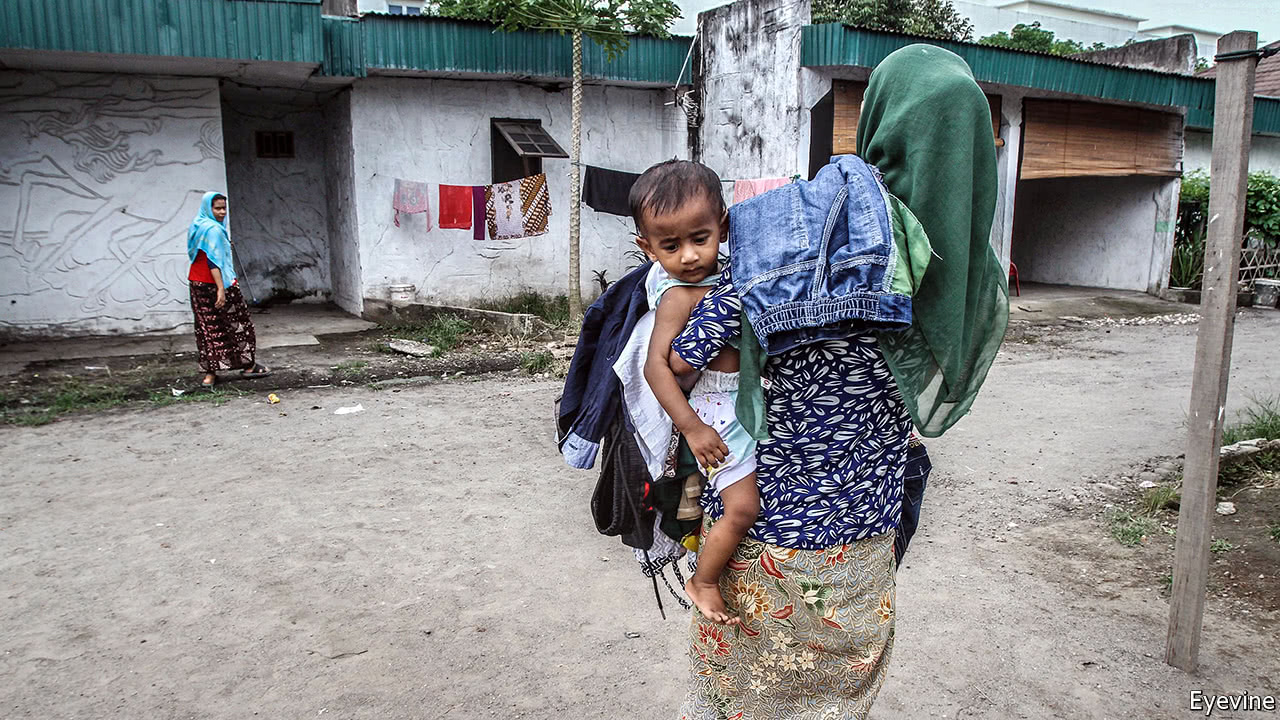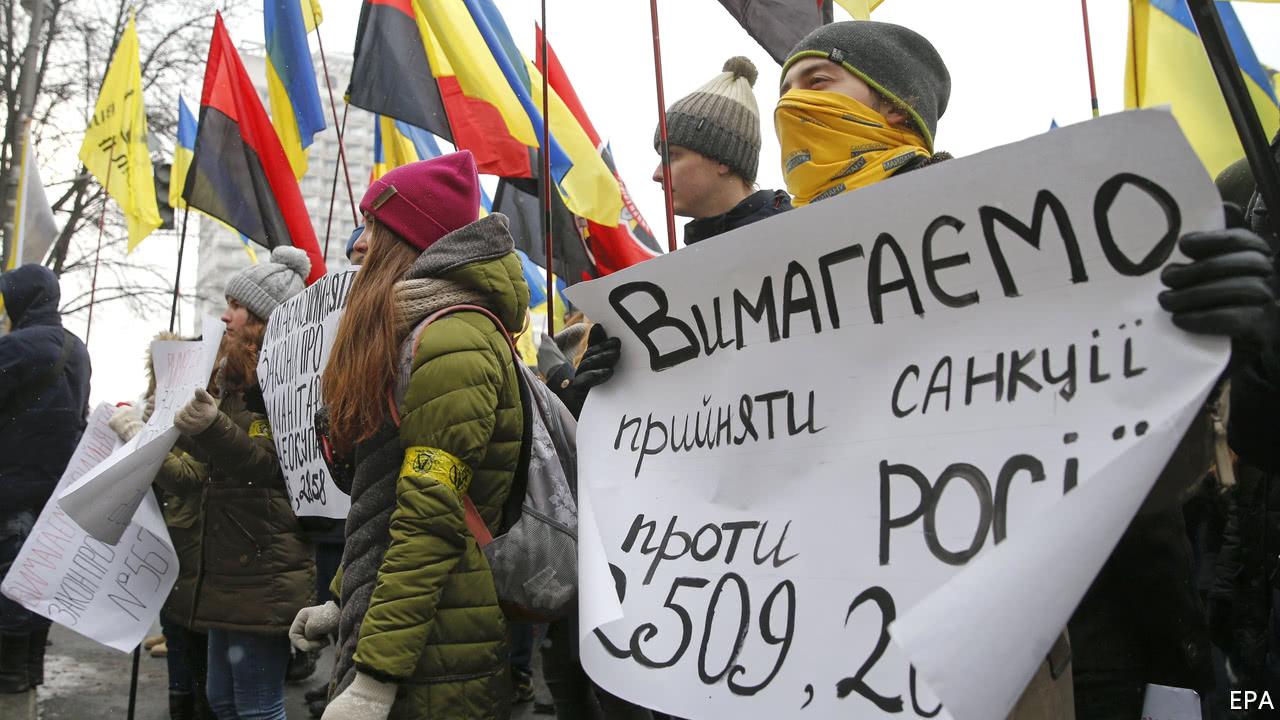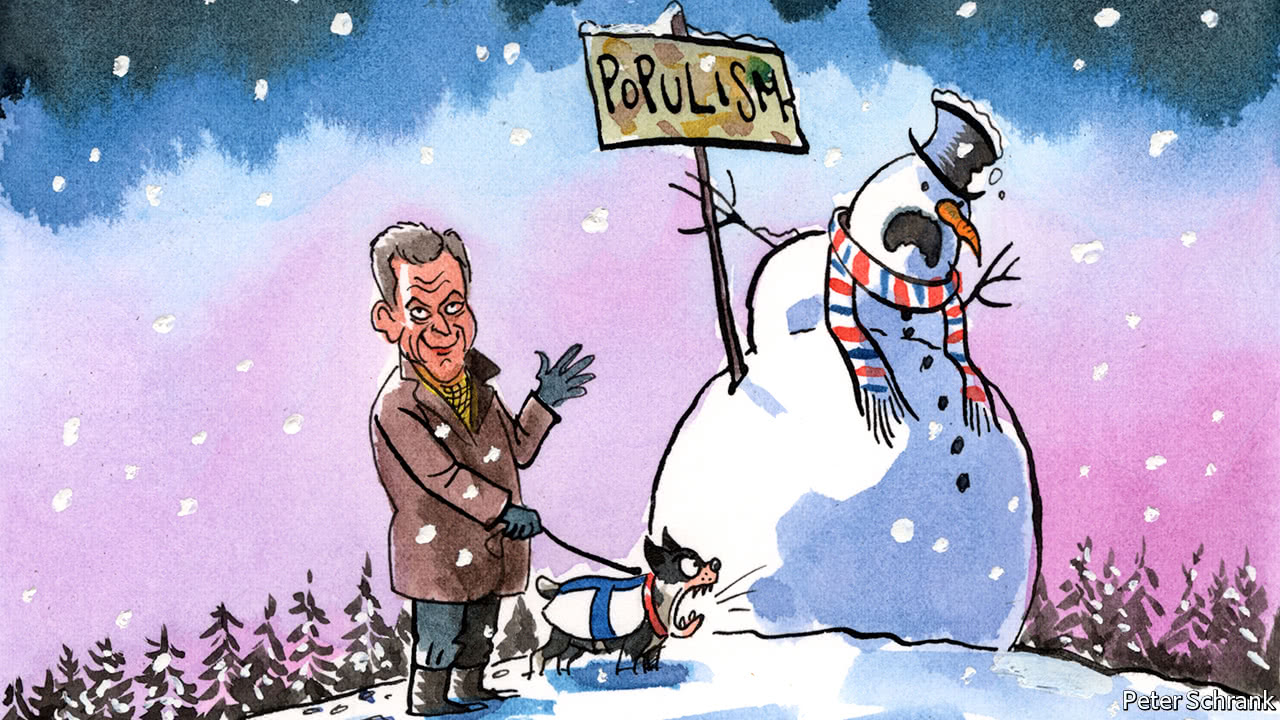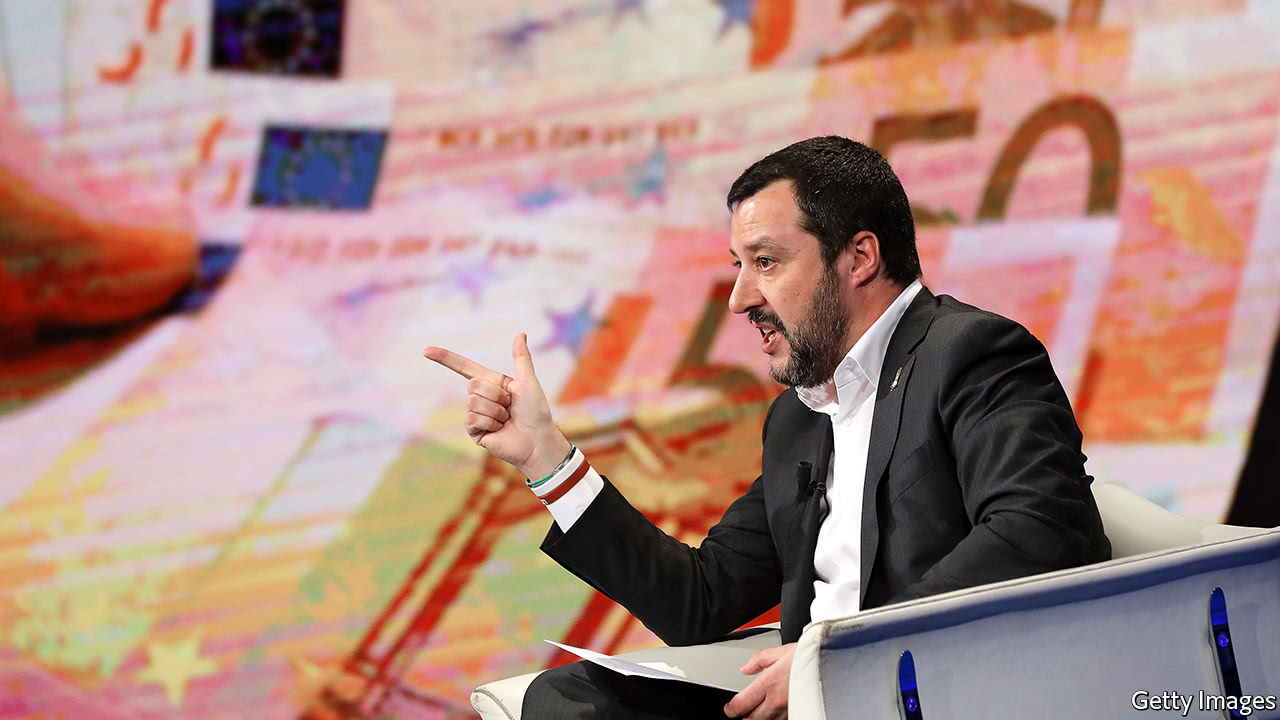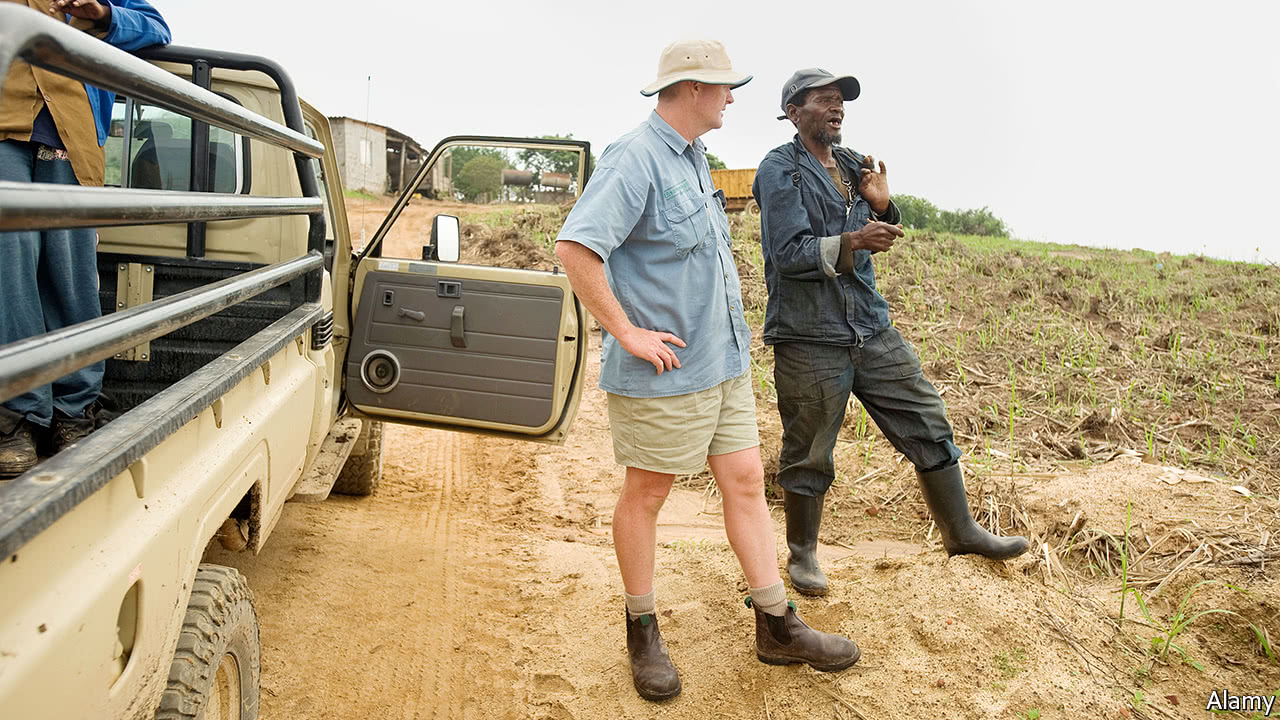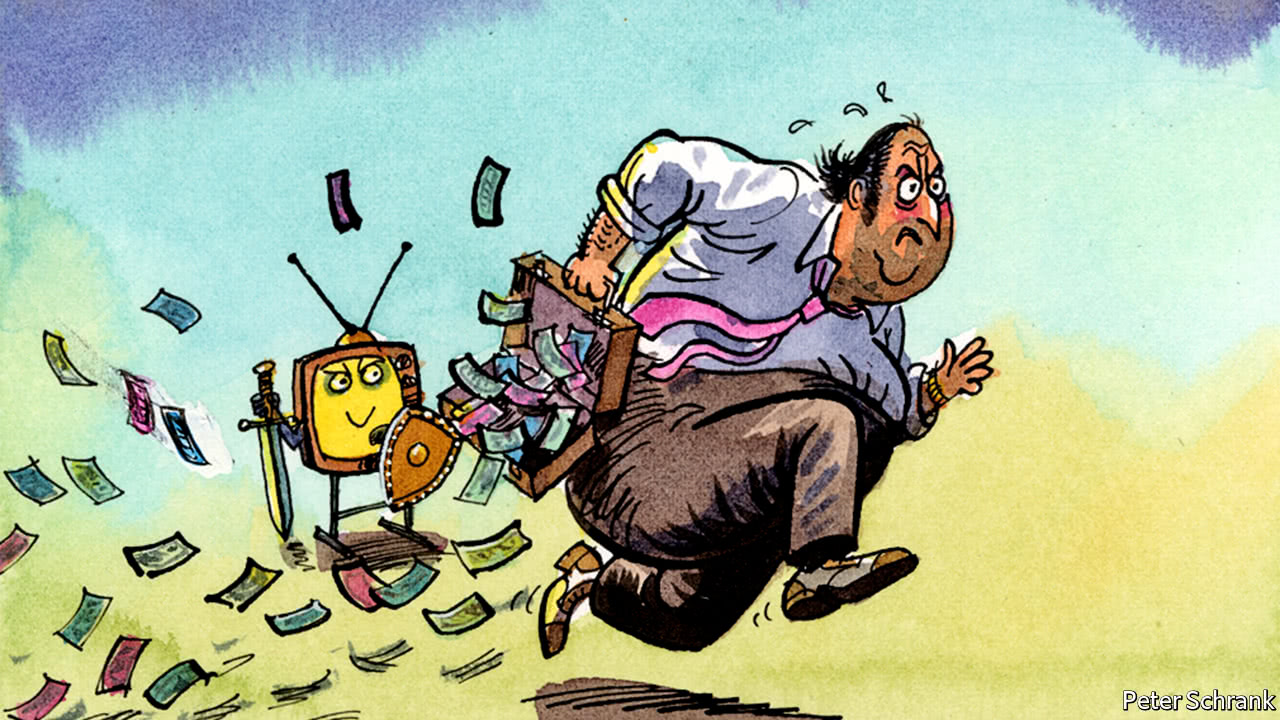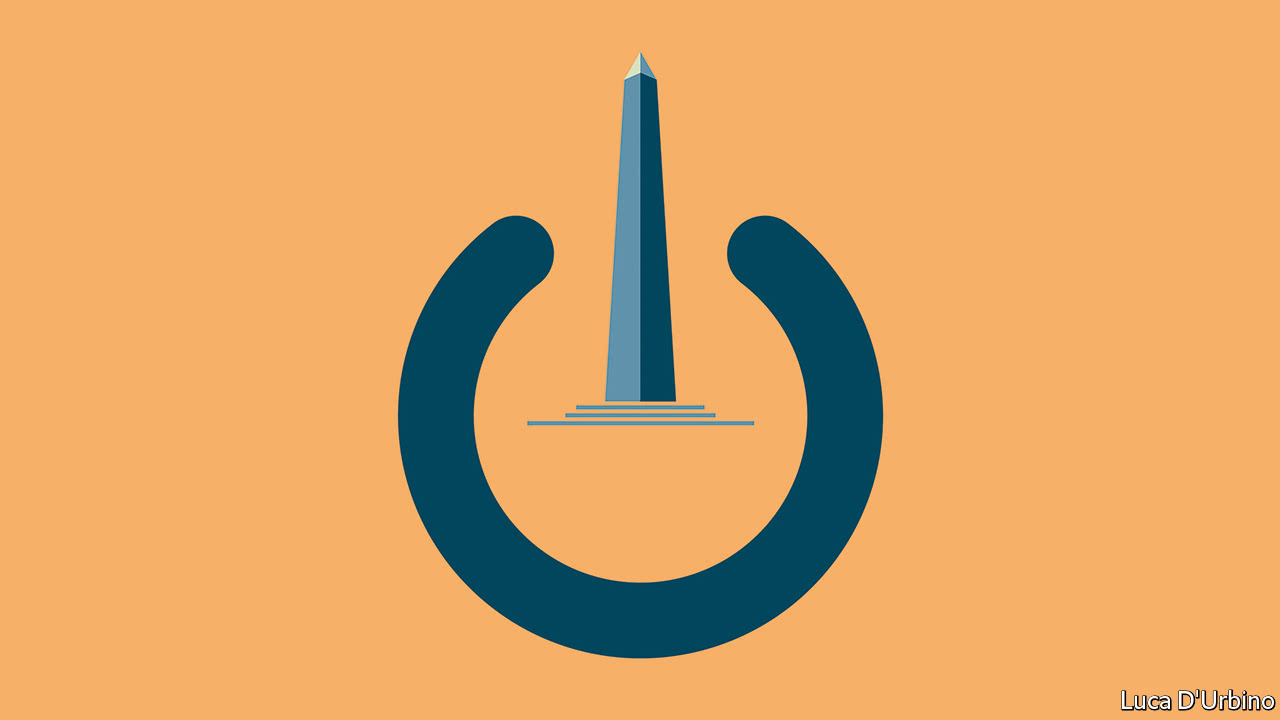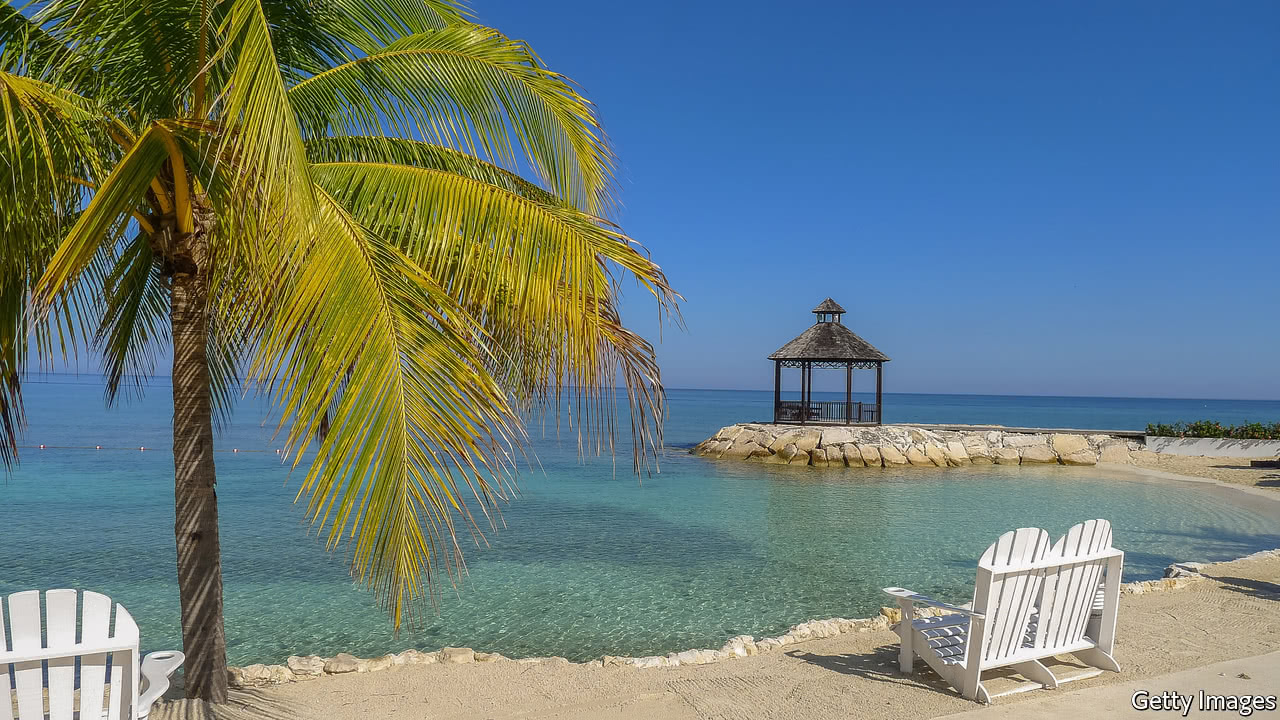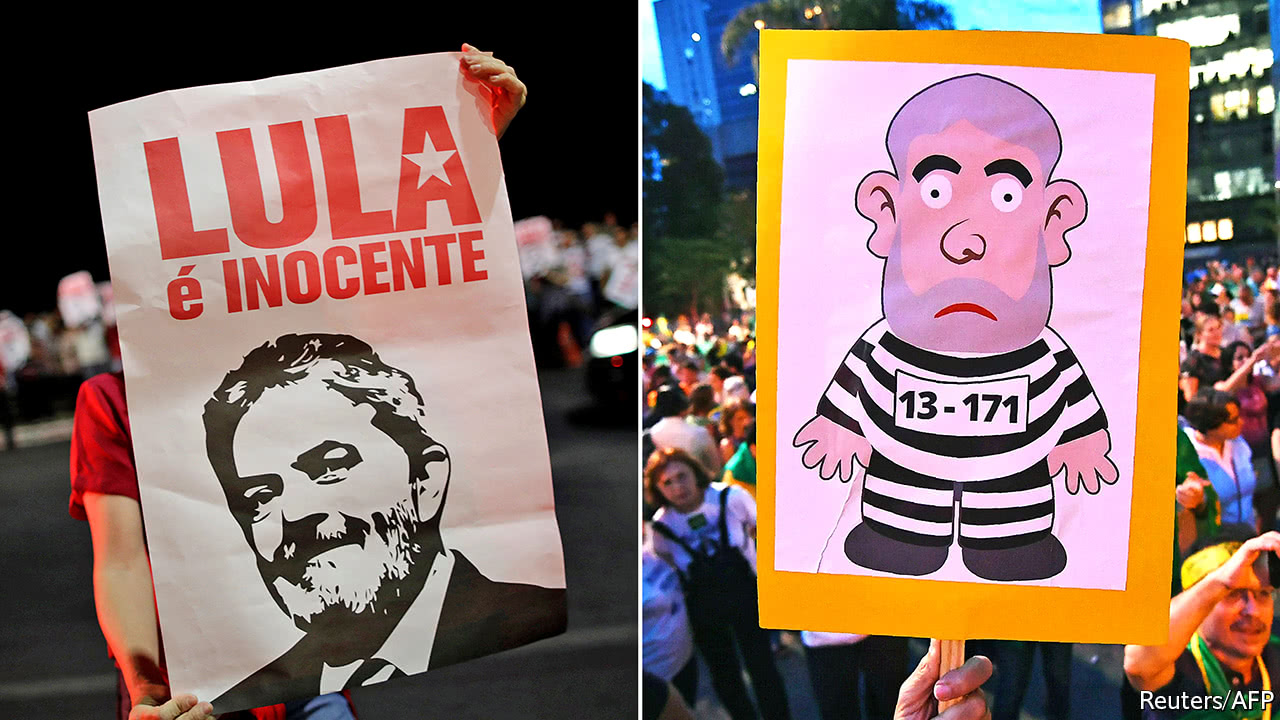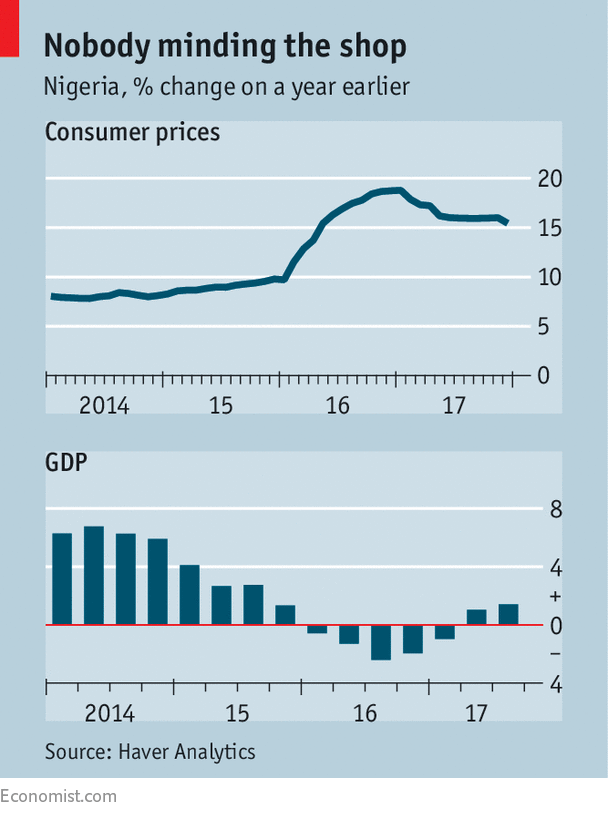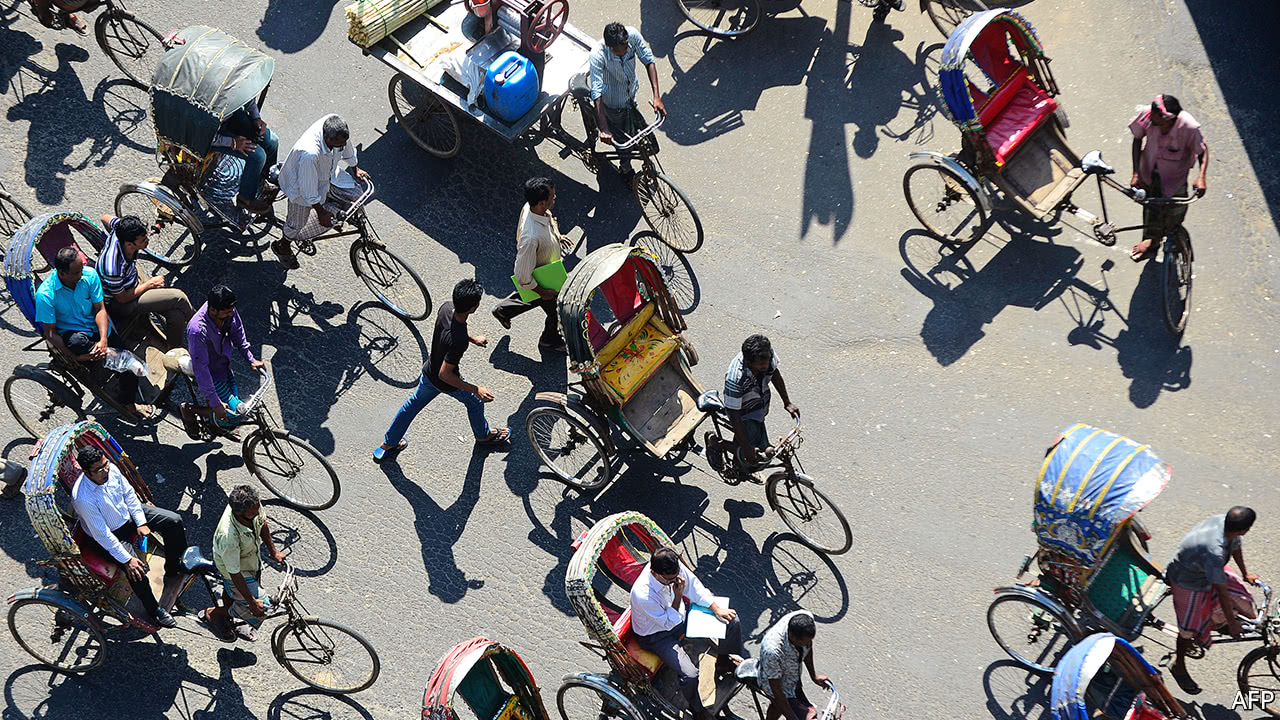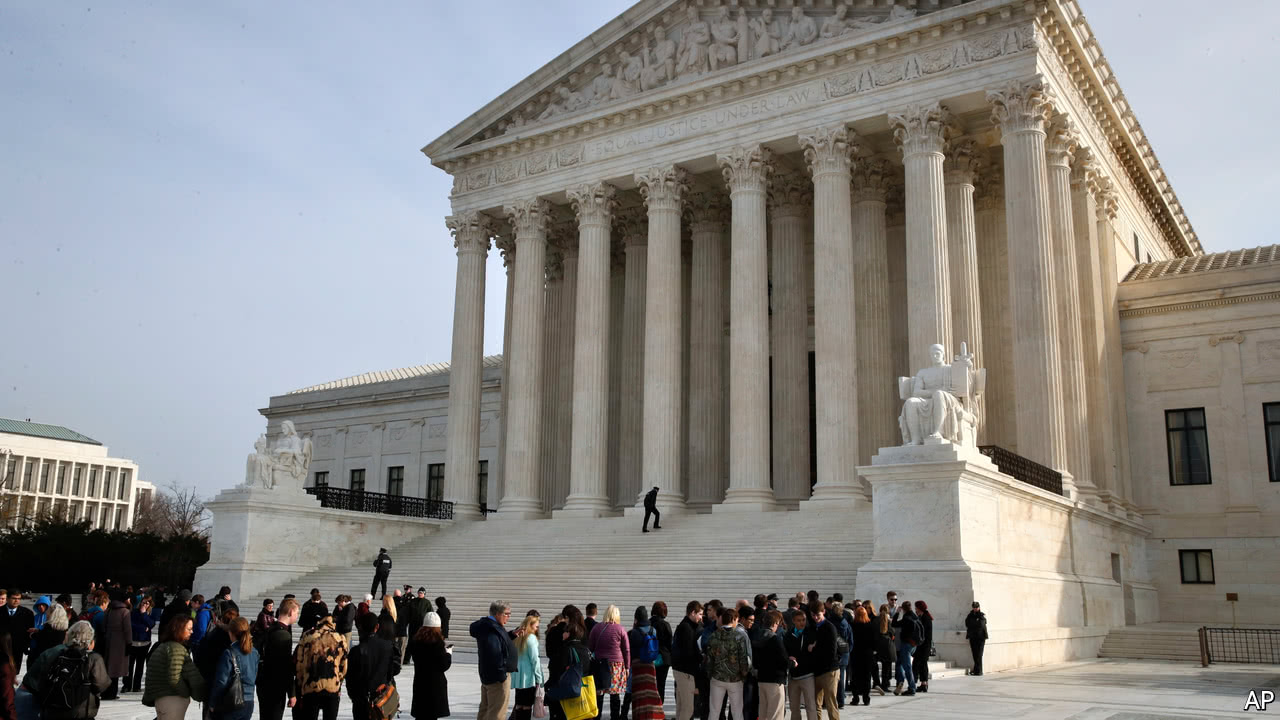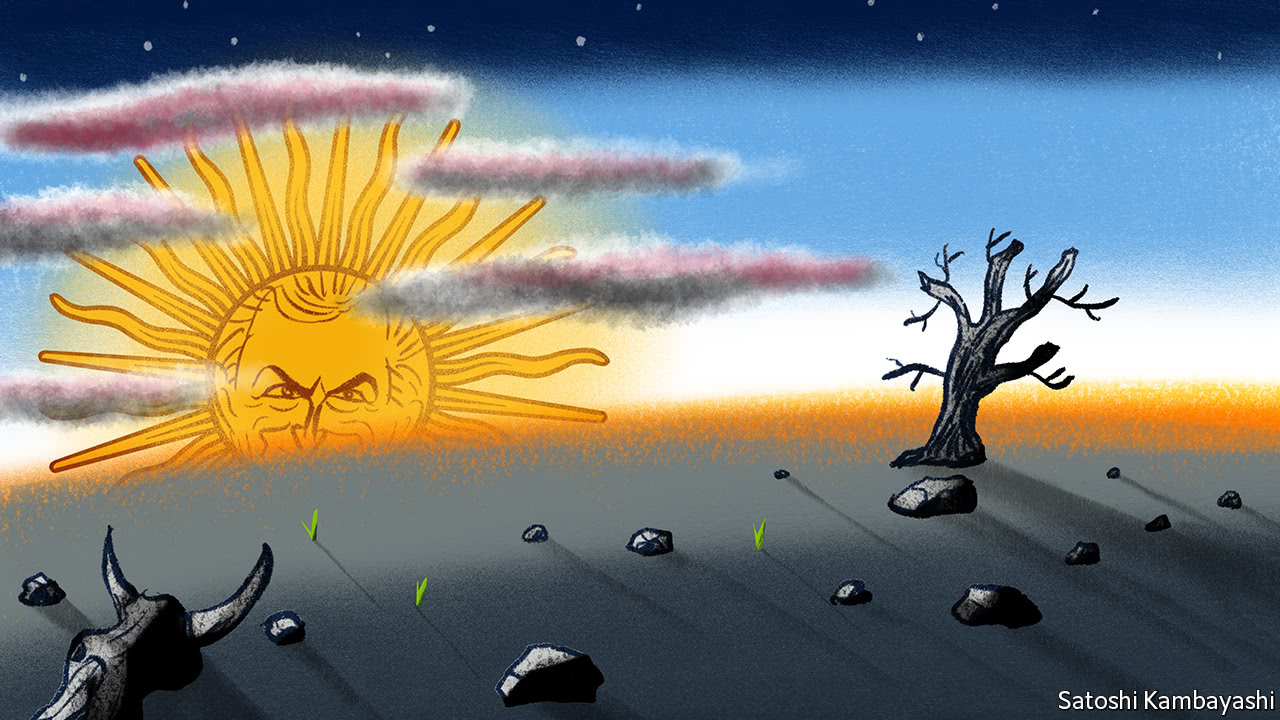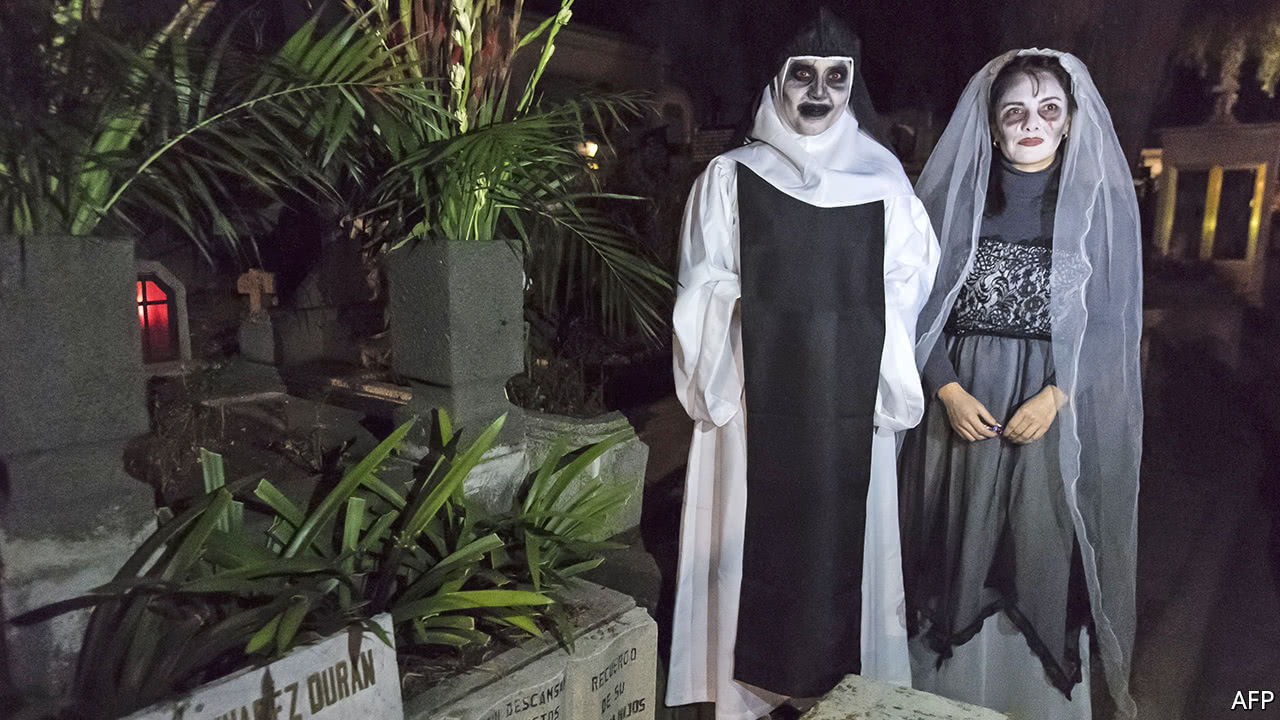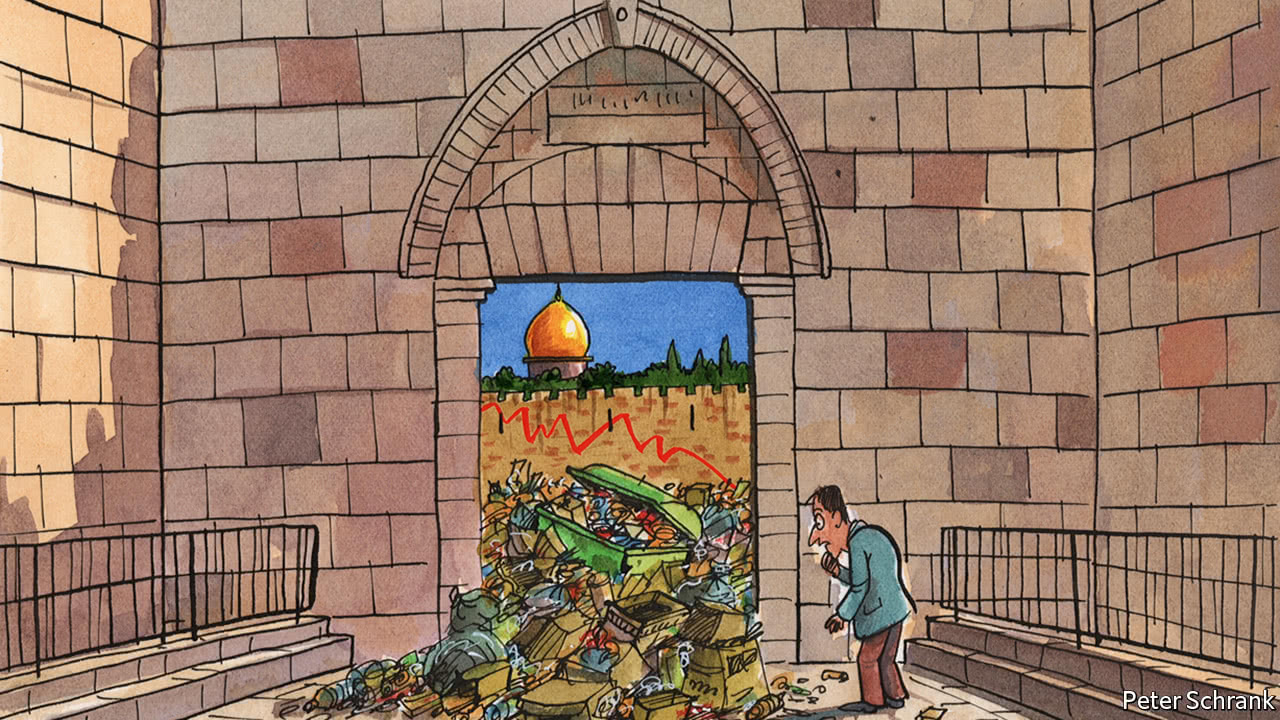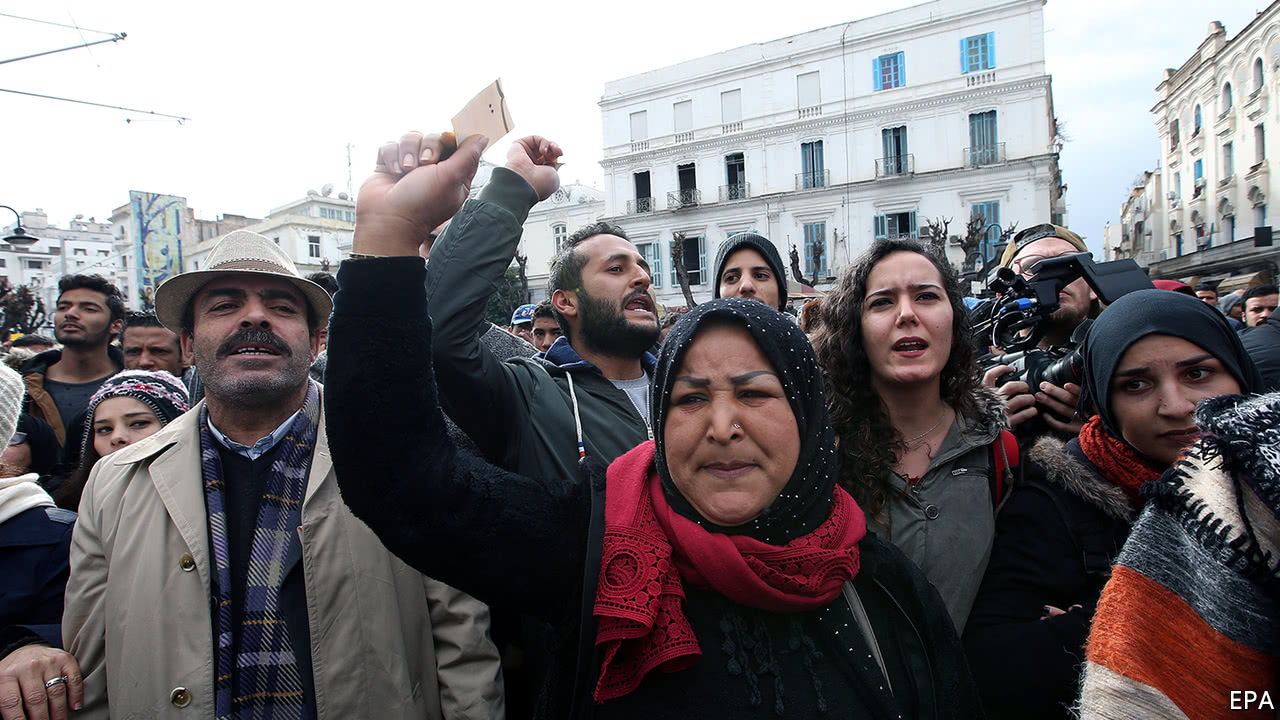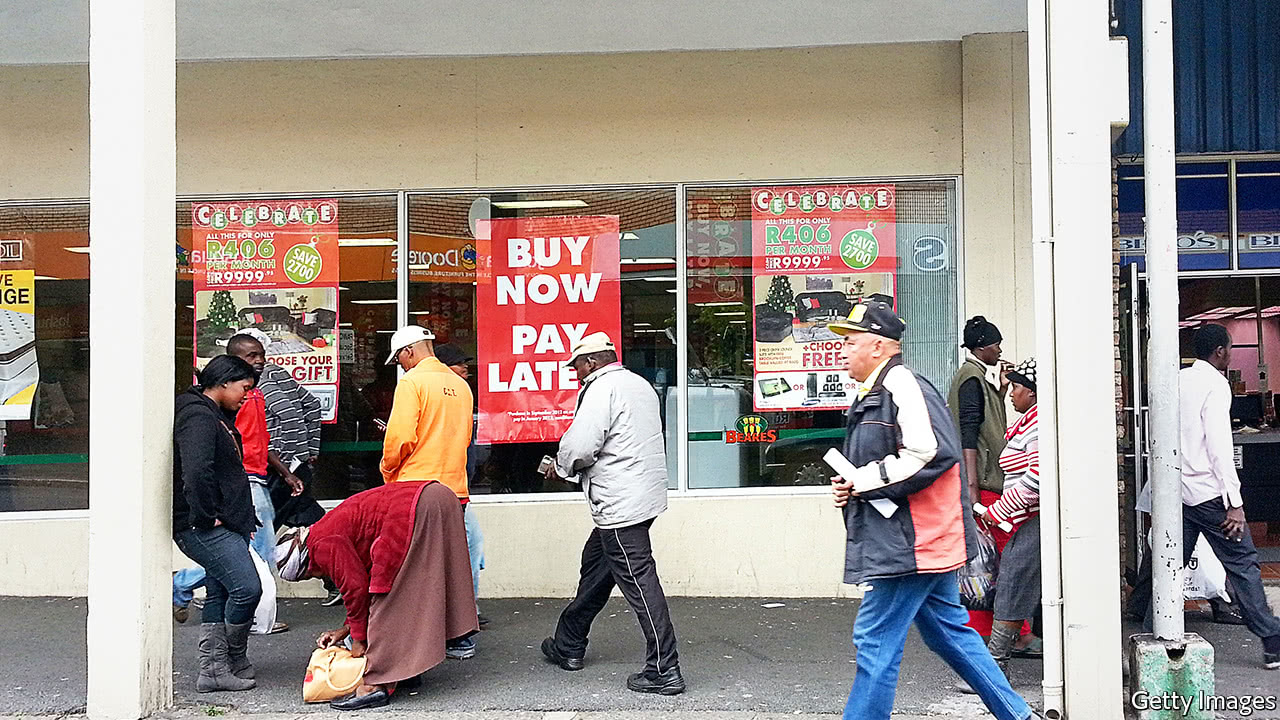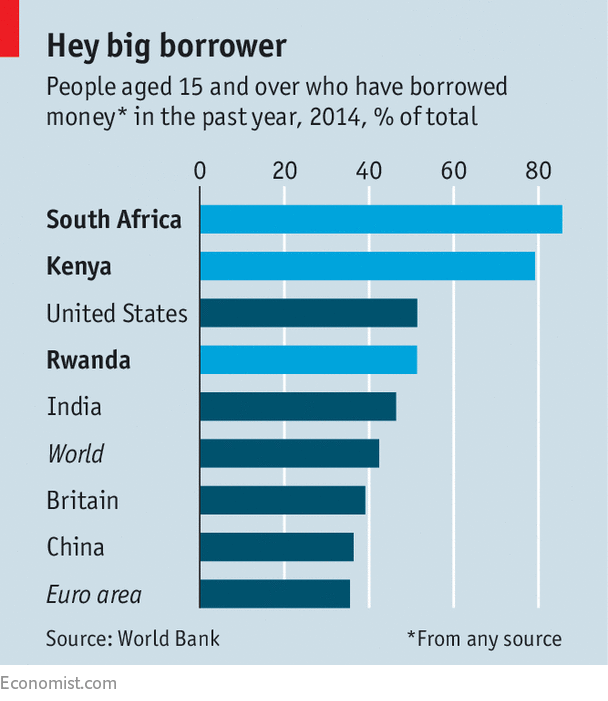Wednesday, 31 January 2018
What Should the Fed Do When No One Listens?
from WSJ.com: Markets http://ift.tt/2DSH4w4
via https://ifttt.com/ IFTTT
Will Insurers Follow Chubb's Lead to Recovery?
from WSJ.com: Markets http://ift.tt/2DP9Wck
via https://ifttt.com/ IFTTT
Boeing Flying High, But How Good Can It Get?
from WSJ.com: Markets http://ift.tt/2nuVcEu
via https://ifttt.com/ IFTTT
Health Care 'Tapeworm' Faces New Threat
from WSJ.com: Markets http://ift.tt/2DRaZJ5
via https://ifttt.com/ IFTTT
Muhammadu Buhari starts to jockey for a second presidential term
THE mantle of power is so heavy in Nigeria that presidential candidates must be begged to run for office, or at least give that appearance. There was no serious doubt that the current president, Muhammadu Buhari (pictured), would run in 2015; that was his fourth attempt to win through the ballot box, having first tasted power with a 19-month stint as a military dictator in the 1980s. Yet even he had to maintain the fiction ahead of that vote, with allies saying that they had begged him to stand. Now, little more than a year away from the next presidential election in 2019, the theatrics are starting again.
In September 2017 the communications minister, Adebayo Shittu, was appointed to chair a “dynamic support group” to campaign for Mr Buhari’s re-election. The name seems over-energetic for a candidate who was nicknamed “Baba Go Slow” during his lethargic first few years in office. “He has not made up his mind but...some of us can assist him in making up his mind,” Mr Shittu...Continue reading
from Middle East and Africa http://ift.tt/2E3WD7m
via https://ifttt.com/ IFTTT
Electronic Arts: On to the Next Battle(field)
from WSJ.com: Markets http://ift.tt/2BG3Yo8
via https://ifttt.com/ IFTTT
Samsung Still Saying Thanks for the Memories
from WSJ.com: Markets http://ift.tt/2E0Sr8h
via https://ifttt.com/ IFTTT
Watch Out: The 'China Price' Is Weakening Again
from WSJ.com: Markets http://ift.tt/2FtaTnd
via https://ifttt.com/ IFTTT
Even for Rohingya refugees who move on from Bangladesh, life is grim
INSIDE a cramped flat beside a motorway in Puchong, a suburb of Kuala Lumpur, 13 Rohingyas jostle for space. Rows of washing, rather than pictures, hang along grimy white walls. Rubbish is stacked on two mouldy refrigerators. The only furniture in the main room is a sideboard stuffed with bedding, for when the adults—who spend their time doing odd jobs, such as collecting waste or selling scrap—come back at the end of the day to sleep on the floor. Several are gaunt, and complain of eating only one or two meals a day. With little else to play with, a toddler sucks on a metal padlock as if it were a toy.
Rohingyas are a Muslim minority who live in Rakhine state in largely Buddhist Myanmar. Over the past five months some 680,000 of them have fled to Bangladesh to escape a pogrom conducted by the Burmese army and their Buddhist neighbours. They now live in crowded and unhygienic shantytown camps just over the border. In theory, the Burmese...Continue reading
from Asia http://ift.tt/2BEuxu8
via https://ifttt.com/ IFTTT
A new breed of conglomerates is helping to prop up North Korea
“A UNIQUE and sweet taste,” says a poster describing a new brand of soju, a local firewater, made by Naegohyang. The North Korean company started out making cigarettes (reportedly puffed on by Kim Jong Un, the country’s dictator). It has branched out into a thicket of unrelated items, including playing cards, sanitary towels, sports kit and electronics. It advertises them in the stadium of the women’s football team it sponsors.
Naegohyang, which means “My Homeland”, is one of what appears to be a growing number of large and diversified businesses in North Korea. In Kwangbok Area Shopping Centre in Pyongyang, the capital, Naegohyang’s “7.27” cigarettes compete with “Hanggong” (meaning “airline”) brand, produced by Air Koryo, the national carrier. The latter, too, appears to be expanding into several industries, from making potted pheasant and canned mackerel to operating taxis and petrol stations.
Such conglomerates are often compared to...Continue reading
from Asia http://ift.tt/2nntpGV
via https://ifttt.com/ IFTTT
Low-caste Indians are better off than ever—but that’s not saying much
FOR Dalits, these are the best of times. Once known as untouchables and reviled as ritually unclean, this sixth of India’s population has never been more integrated. Since the constitution banned discrimination against untouchables 70 years ago, and with quotas for state schools, jobs and elected offices giving Dalits a leg up, gaps in education, income and health have steadily shrunk.
Dalits, who in the past feared crossing certain streets, now have their own millionaire-filled chamber of commerce, scores of energetic NGOs to promote their rights and some 84 of the 545 MPs in the Lok Sabha, the lower house of parliament. In October a board that manages hundreds of Hindu temples in the southern state of Kerala for the first time broke one of the last ancient taboos, inducting six Dalits to serve as priests. Ram Nath Kovind, who was elected India’s president in July, was born into a weaver caste, making him the second Dalit to serve as head of state.
But Indian presidents hold little...Continue reading
from Asia http://ift.tt/2BFb2BB
via https://ifttt.com/ IFTTT
Tuesday, 30 January 2018
Investors Appear Fed Up with MetLife Missteps
from WSJ.com: Markets http://ift.tt/2GwRRxm
via https://ifttt.com/ IFTTT
iPhone Supply Shock Won't Upend Europe's Star Chip Maker
from WSJ.com: Markets http://ift.tt/2rPAxAH
via https://ifttt.com/ IFTTT
What's the matter with Oklahoma?
FORTY miles from Tulsa, including along unpaved road, sits Wagoner High School, with its 650 students, championship-calibre football team and show barn—a seemingly ordinary small-town school. But unlike most high schools, Wagoner is closed on Mondays. The reason, a severe reduction in state funds, has pushed 90 other school districts in Oklahoma to do the same. Teacher pay is the third-lowest in the nation and has triggered a statewide shortage as teachers flee to bordering states like Arkansas and Texas or to private schools. “Most of our teachers work second jobs,” says Darlene Adair, Wagoner’s principal. “A lot of them work at Walmart on nights and weekends, or in local restaurants.” Ms Adair hopes that Walmart does not offer her teachers a full-time job, which would be a pay raise for many.
The roots of the fiasco are not hard to determine. Like its northern neighbour Kansas, deep tax cuts have wrecked the state’s finances. During the shale boom, Oklahoma lawmakers gave...Continue reading
from United States http://ift.tt/2FukoSY
via https://ifttt.com/ IFTTT
Amazon, Berkshire, JPMorgan Partner to Pare Health Costs
from WSJ.com: Markets http://ift.tt/2EnlikW
via https://ifttt.com/ IFTTT
The Good News in Bond Market Wake-Up Call
from WSJ.com: Markets http://ift.tt/2EppdOb
via https://ifttt.com/ IFTTT
Dell's Problem: Bigger Not Always Better
from WSJ.com: Markets http://ift.tt/2DMdVCD
via https://ifttt.com/ IFTTT
Why don't foreign investors take fright more often?
BACK in the days of the gold standard, central bankers were very concerned about the views of international investors. They believed that maintaining the value of their currencies would reassure creditors. That is why they were so resistant to the idea of floating currencies. Georges Bonnet, a French finance minister, put it best
Who would be prepared to lend with the fear of being paid in depreciated currencies always before his eyes?
This fear still shows up from time to time. Under the old exchange rate mechanism, countries like Italy would undergo periodic devaluations to restore their competitiveness*. As a result, investors would demand a higher bond yield to compensate for this risk. When the single currency was planned, bond yields slowly converged on the German level as the risk of devaluation disappeared. It popped up again in 2011 and 2012 as investors feared some countries might drop out of the euro and reintroduce domestic currencies; that would have required a partial default. (Of course,...Continue reading
from Economics http://ift.tt/2DOSN2w
via https://ifttt.com/ IFTTT
Why It Isn't Yet Time to Worry About Emerging-Market Bonds
from WSJ.com: Markets http://ift.tt/2GxtmAs
via https://ifttt.com/ IFTTT
Why Tencent's Latest Property Deal Makes Sense
from WSJ.com: Markets http://ift.tt/2rWPIrV
via https://ifttt.com/ IFTTT
Wynn Resorts Is the Biggest Test for Investors' Tolerance
from WSJ.com: Markets http://ift.tt/2DLSi5c
via https://ifttt.com/ IFTTT
Keurig-Dr Pepper: Why Coffee and Soda Might Just Mix
from WSJ.com: Markets http://ift.tt/2EmErUk
via https://ifttt.com/ IFTTT
Monday, 29 January 2018
America’s opioid epidemic is driven by supply
LIFE expectancy in America declined for the second year running in 2016 according to data recently released by the Centers for Disease control and Prevention (CDC). Unsurprisingly, major cause was the opioid epidemic. The CDC reported that deaths from drug overdoses rose from 16,848 in 1999 to 63,632 in 2016. The increase was particularly steep among those aged 55 to 64, for whom death rates increased six-fold over that period. Mortality from opioids designed for pain relief spiked from about one-fifth to over one half of total drug deaths.
This grim epidemic has often been blamed on economic conditions; Anne Case and Angus Deaton, economists, have described “deaths of despair” that “come with prolonged economic distress.” But a new paper by Christopher Ruhm at the University of Virginia suggests that economic conditions can only help explain a small fraction of the increase in drug mortality rates. This is...Continue reading
from United States http://ift.tt/2DJgcyu
via https://ifttt.com/ IFTTT
Apple's High Bar
from WSJ.com: Markets http://ift.tt/2DKjOnY
via https://ifttt.com/ IFTTT
Dollar's Drop Fuels a Fire That's Already Raging
from WSJ.com: Markets http://ift.tt/2nmXiXa
via https://ifttt.com/ IFTTT
China's Big Car Makers Are Driving at Different Speeds
from WSJ.com: Markets http://ift.tt/2DLAqvz
via https://ifttt.com/ IFTTT
Baker Hughes Suffers From a GE Discount
from WSJ.com: Markets http://ift.tt/2nneCeB
via https://ifttt.com/ IFTTT
Saturday, 27 January 2018
Republicans in Pennsylvania ask the Supreme Court to restore their map
A NOVEL judicial decision in Pennsylvania has prompted a rather desperate request to the country's Supreme Court. The subject, gerrymandering, is an increasingly familiar one in America’s courts: a time-worn, now computer-weaponised ploy whereby political parties rig electoral maps to rope out the opposition. Republicans in Pennsylvania did a bang-up job of capitalising on their power after taking control of the legislature in 2010. Their creatively redrawn map delivered 13 of the state’s 18 seats in the House of Representatives to their party in 2012, 2014 and 2016—despite Republicans commanding only about half of the state-wide vote in each election.
On January 22nd Pennsylvania’s Supreme Court ruled that this gerrymander was unfair to voters (see article). The congressional map “clearly, plainly and palpably” violates the state constitution, the court decided in a 4-3 vote. Though the...Continue reading
from United States http://ift.tt/2BwcDcM
via https://ifttt.com/ IFTTT
Friday, 26 January 2018
How protests can affect elections
WHEREVER Donald Trump goes, protests follow. In Davos this week anti-capitalists marched through Swiss cities to protest the president’s visit to the World Economic Forum in Davos. In America the previous week women protested against the president in a series of nationwide marches that marked the end of his first year in office. The women’s marches, in more than 250 cities, appear to be part of a new era of female political activism in America; a record number of women are running for office in mid-term elections in 2018.
Research suggests that protest movements can have a significant impact on elections. Stan Veuger of the American Enterprise Institute and colleagues made a striking discovery when they studied the effect of rallies held by the Tea Party movement on April 15th 2009 against high taxes and government spending. The researchers found that in places where it rained that day, rallies were half the size of places where it stayed dry. They used this randomly caused variation in attendance to estimate the impact of rally...Continue reading
from United States http://ift.tt/2DNJjUu
via https://ifttt.com/ IFTTT
Why Consumers Can't Keep Driving the Economy
from WSJ.com: Markets http://ift.tt/2nejFOd
via https://ifttt.com/ IFTTT
Ukraine proposes a law that infuriates Russia
AFTER nearly four years of war in eastern Ukraine, and more than 10,000 deaths, reports from international monitors in the region sound like a grim broken record. On January 19th: 340 explosions. On January 20th: 240 explosions. On January 21st: 195 explosions and two middle-aged civilians hit by rifle fire while travelling in a bus near a separatist checkpoint in the town of Olenivka. “One had blood covering the left side of his face and was holding gauze to it and the other had gunshot wounds in his neck and left cheek,” the monitors from the Organisation for Security and Co-operation in Europe (OSCE) reported this week. One of the men ended up in hospital; the other died at the site of the attack.
The Minsk agreements, a peace plan signed in early 2015, are meant to prevent such incidents. Yet an end to the conflict in the Donbas region remains a distant dream. Russia bears the brunt of the blame for failing to rein in its separatist allies in the area and secure a ceasefire. But...Continue reading
from Europe http://ift.tt/2Bvu6lE
via https://ifttt.com/ IFTTT
Finland’s down-to-earth president is set to sail to re-election
IN EUROPE’S frozen north, two presidents are standing for re-election: Russia’s Vladimir Putin and Finland’s somewhat lesser-known Sauli Niinisto. Both are likely to win with huge majorities. Some 70% of Finns back Mr Niinisto, polls say—a Putinesque level of support. Mr Niinisto looks likely to glide to victory in the first round of voting on January 28th. In a world where outsiders and populists are on the march, how does he do it? Unlike Mr Putin, he has none of the advantages of being an autocrat; Finland is one of the world’s freest democracies.
True, the Finnish presidency is mainly a symbolic role, focused on glad-handing foreigners and with little power over internal politics. Yet Mr Niinisto has a reputation for competence at both. As the Speaker of parliament, he won applause by encouraging MPs to travel second-class and book cheaper hotels. When he was finance minister in the late 1990s he slashed public debt from 60% to just over 40% of GDP, tickling the Finnish love of...Continue reading
from Europe http://ift.tt/2ncKgME
via https://ifttt.com/ IFTTT
In Europe, right-wing parties are offering bigger handouts than traditional ones
IT IS not cold inside the Municipal Family Support Centre, but Barbara Choinska keeps her coat on, in the manner of people to whom the world has been hostile. The centre is the main social-services point in Siedlce, a town 90km east of Warsaw. Ms Choinska has five children, no husband and no job. “She struggles to make sure the children are dressed and do their homework,” explains Adam Kowalczyk, the centre’s director. “We send someone each week to help her maintain basic standards, so they don’t get taken away by the state.”
One thing Ms Choinska no longer worries about is having money for food and rent. In 2016 Poland’s new government, led by the populist Law and Justice (PiS) party, launched the “Family 500Plus” programme, which pays a monthly stipend of 500 zlotys ($148) per child, starting with the second. Indigent parents like Ms Choinska qualify for their first child, too, so she gets a whopping 2,500 zlotys per month. In Poland, that is not far short of the median after-tax...Continue reading
from Europe http://ift.tt/2BwqVKr
via https://ifttt.com/ IFTTT
Whoever wins the election, Italy is not about to leave the euro
THE man who has done more than anyone to create an air of apprehension around Italy’s coming election is a genial fellow with a round face, a broad nose and silvery hair combed forward in the style of the ancient Romans. Five years ago, Claudio Borghi, a former managing director of Deutsche Bank in Italy, converted Matteo Salvini, the head of the Northern League, to the view that Italy should quit the euro.
“Salvini called me at half past one in the morning,” he recalls. “But it didn’t matter because I don’t sleep.” After two days of explanation, Mr Salvini, soon to become leader of the League, was convinced. The following year, he and his new economic adviser set off on a “Basta euro” (roughly, “dump the euro”) tour.
The concern in EU governments and capital markets over the vote on March 4th centres on the possibility that the League will return to government, and the remoter, but...Continue reading
from Europe http://ift.tt/2nf3XmM
via https://ifttt.com/ IFTTT
Splits over the Iran deal test Europe’s bond with America
PITY the poor European who seeks consistency. On January 22nd Mike Pence, America’s vice-president, said that the United States was on the verge of quitting the nuclear agreement signed with Iran in 2015. At the same time Rex Tillerson, the secretary of state, was in London expressing optimism that the deal could be saved with a bit of tinkering. Foreign ministers from across the European Union were in Brussels that day; the confusion hovered above their conversation like an Amazon drone bearing either chocolates or dynamite.
Mr Trump’s carnivalesque approach to the presidency has made life hard for America’s allies, but his first year in office has not brought forth anything like the full horrors that some predicted. Congress has boxed him in on Russia, NATO does not yet totter and trade wars have failed to break out (although this week brought worrying news). Even if many Europeans reject Mr Trump as baffling and odious—just 25% in a recent Gallup survey express approval of his...Continue reading
from Europe http://ift.tt/2BvsIzA
via https://ifttt.com/ IFTTT
Donald Trump tells leaders in Davos that America is open for business
AMERICA’s 45th president went to the World Economic Forum in Davos, a gathering of influential people in favour of unfashionable ideas like free trade and world peace, and gave a speech. The performance was a little low energy, as Donald Trump once said of Jeb Bush, but 90% of his speech could have been given by almost any other American president. Based on the speech alone, you might conclude that Mr Trump is not so different from any other American president or, at least, less different than you had been led to believe during his first year in office. You would be wrong.
A useful way to think about Mr Trump’s politics is as a collection of impulses, usually contradictory, untroubled by a need to be overly consistent. One strong impulse is to stand up for the kind of forgotten Americans who he believes put him in the White House: think white, Midwestern people who lost their steady jobs to outsourcing (and forget that many such folks voted for his opponent). This impulse gives rise to the America First hostility to immigration, trade and...Continue reading
from United States http://ift.tt/2Gj280f
via https://ifttt.com/ IFTTT
A Huge Bet That Movie Theaters Aren't Going the Way of the Dodo
from WSJ.com: Markets http://ift.tt/2DBFnTo
via https://ifttt.com/ IFTTT
Colgate's Checkup Doesn't Go Well
from WSJ.com: Markets http://ift.tt/2EcI1QQ
via https://ifttt.com/ IFTTT
Ethiopia’s regime flirts with letting dissidents speak without locking them up
LIFE in Maekelawi, a prison in Addis Ababa, the capital of Ethiopia, had a predictable rhythm. Three times a day, Atnaf Berhane and Befekadu Hailu were hauled from the dank, dark cell they nicknamed “Siberia” for three hours of interrogation and beating. Mr Befekadu was flogged across his bare feet with an electric cable. Mr Atnaf escaped this particular cruelty. “I was lucky,” he says.
The two Ethiopian activists, members of a blogging group known as Zone 9, were arrested in 2014. After three months in Maekelawi they were charged with terrorism. After 18 months behind bars those charges were dropped, though both are still accused of the lesser crime of inciting violence. Ethio Trial Tracker, a website, claims that 923 Ethiopians are in prison on terrorism charges. Human Rights Watch, a pressure group, counts thousands more detained for their political opinions.
The ruling Ethiopian People’s Revolutionary Democratic Front (EPRDF) has a habit, always...Continue reading
from Middle East and Africa http://ift.tt/2GiynwG
via https://ifttt.com/ IFTTT
South Africa is getting land reform wrong
HANNES BOOYENS, clad in the khaki shorts and shirt of the Afrikaner farmer, shows off tidy rows of trees hanging heavy with grapefruits, soon to be plucked for export. Hezekiel Nkosi, the chairman of the Moletele Communal Property Association, which owns the land and employs Mr Booyens, nods approvingly. “We are happy,” Mr Nkosi says. “We need the best technology, the best farm managers. Otherwise this is a fruitless operation.”
The Moletele people were forced from this land, a picturesque corner of South Africa’s Limpopo province, mainly in the 1950s and 60s. They got back 7,000 hectares of citrus and mango farms in 2007 after a legal claim but struggled to run them. One of the farms collapsed. Moletele leaders went looking for help. The Vumelana Advisory Fund, a non-profit that helps land reform projects, appointed advisers to develop a commercial partnership. The Moletele community now has access to capital and expertise. Young people are...Continue reading
from Middle East and Africa http://ift.tt/2rHjgcK
via https://ifttt.com/ IFTTT
Can a reality TV show discourage corruption?
THE timing could not have been better. In the same week as two civil servants in Nigeria appeared in court for embezzling funds earmarked for International Anti-Corruption Day, the finalists of “Integrity Idol” were announced. In this reality television show, honest civil servants working in corrupt countries compete for glory, fame and, occasionally, a live chicken. The show is a hit: over 10m people have watched it and more than 400,000 have cast their votes in favour of their Integrity Idols.
“Integrity Idol” started in Nepal in 2014 and has since spread to Pakistan, Mali, Liberia, Nigeria and South Africa. Five finalists, vetted by a panel of judges, are chosen to be interviewed. They explain why they deserve the prize. “I come to work late. My boss could ask ‘Why are you late?’ (…) I say I slept a little longer. Say it the way it is! Face the consequences!” one nominee exhorts.
It is not always easy to find good contestants. The Nigerian nomination period was...Continue reading
from Middle East and Africa http://ift.tt/2rFACGN
via https://ifttt.com/ IFTTT
Is America wrong to cut aid to Palestinian refugees?
A TRIP billed as a show of support for Christians had a noticeable lack of them. On January 22nd Mike Pence, America’s vice-president, landed in Israel on the last leg of a three-country jaunt. Originally scheduled for December, it was delayed after Donald Trump made the controversial decision to recognise Jerusalem as Israel’s capital. When Mr Pence arrived at last, the Palestinians blackballed him. So did Christian leaders in Egypt and Jordan. Mr Pence, a devout Christian himself, did not even set foot in a church in the Holy Land.
No one was sure why he came. His meetings with Israeli and Arab leaders were routine, save for a speech in the Knesset, where he announced that America would move its embassy to Jerusalem by the end of 2019. The trip seemed to be about domestic politics: for Mr Pence, a nod to his evangelical base; for Binyamin Netanyahu, Israel’s scandal-plagued prime minister, a chance to look like a...Continue reading
from Middle East and Africa http://ift.tt/2GjL5eD
via https://ifttt.com/ IFTTT
Turkey’s offensive in Syria complicates an already chaotic war
SEVENTY-TWO Turkish fighter jets cut through the skies above north-west Syria on January 20th, dropping bombs on the Kurdish enclave of Afrin, while thousands of Turkish troops massed at the border. They were joined by busloads of Syrian rebels, Turkey’s proxies in the fight against Bashar al-Assad’s blood-soaked regime in Damascus. So it was that Turkey opened a new front in the Syrian war, and in its unending conflict with Kurdish insurgents, with reverberations rippling to Washington, Moscow and Istanbul.
The offensive pits NATO’s second-biggest army against a Kurdish militia called the People’s Protection Units (YPG), which Turkey says is a branch of its domestic foe, the Kurdistan Workers’ Party (PKK). The separatist PKK has fought an on-off insurgency against Turkish security forces for over three decades. But the YPG is best known for fighting Islamic State (IS) in Syria. American support, in the form of weapons and air strikes, helped the Kurds repel the jihadists and, to...Continue reading
from Middle East and Africa http://ift.tt/2Gjld29
via https://ifttt.com/ IFTTT
Tencent Buys Help From the Terminator
from WSJ.com: Markets http://ift.tt/2rHUetV
via https://ifttt.com/ IFTTT
No Flaws in Intel's Earnings
from WSJ.com: Markets http://ift.tt/2GijTN2
via https://ifttt.com/ IFTTT
Thursday, 25 January 2018
Why Donald Trump has become a pro-life crusader
OF ALL Donald Trump’s policy contortions none is more dramatic—some would say incredible—than his position on abortion. In 1999 he described himself as “very pro-choice.” During his presidential campaign, after some ambiguous statements about what he believed, Mr Trump published a written statement declaring that he was “pro-life with some exceptions”. By the time he became president his transformation into ardent pro-lifer seemed complete. This week, he designated January 22nd, the anniversary of Roe v Wade, “National Sanctity of Life Day” and declared that “the fight to protect life is not yet over”.
Last week, Mr Trump became the first president to address the anti-abortion protestors who have gathered annually in the capital ever since Roe was settled 45 years ago. Speaking via video link from the Rose Garden (Ronald Reagan and George W. Bush had merely phoned in) he told the mostly crowd, many of them nuns, priests, and busloads of students from Christian schools, that thanks to them, “tens of...Continue reading
from United States http://ift.tt/2DO8Lcv
via https://ifttt.com/ IFTTT
Fentanyl is lethal and almost impossible to keep out of the country
IN A cavernous warehouse near Los Angeles International Airport, United States Customs and Border Patrol (CBP) officers process six packages per second. As cardboard boxes and manilla envelopes from around the world stream through x-ray machines, officers with handguns tucked into their waistbands scan screens for anomalies in the images. Last summer officers at the warehouse found three live King Cobras coiled into aerated potato-crisp cans. On a recent morning they found nothing creepy or crawly, only bags full of dried orange skins and Chinese meat snacks disguised as candy. Mostly, however, they found drugs: counterfeit Viagra, vials of steroids and small plastic bags full of unidentified white powders.
Officers are particularly worried about one drug: fentanyl. Kevin McAleenan, the acting commissioner of CBP, says the drug is the agency’s priority. A synthetic opioid, fentanyl is 50 times stronger than heroin and 100 times more potent than morphine. The drug is largely behind the...Continue reading
from United States http://ift.tt/2GfZUib
via https://ifttt.com/ IFTTT
Restoring black Americans to the saddle
APART from the Missy Elliot and Ludacris songs that blare through the speakers in lieu of country tunes, the Bill Pickett Invitational sounds and looks like a typical rodeo. In the dirt arena cowboys and cowgirls cling to bucking broncos. They rope calves and weave in and out of barrels. The stands are packed with fans decked out in cowboy hats and boots who nibble at barbecued chicken and gasp when riders are thrown to the ground. At half-time there is “mutton busting”, an event in which small children are plonked onto the backs of sheep and ordered to hang on as their fuzzy mounts dart around the ring. The biggest difference is that all the contestants—and most of the audience—are black.
The Bill Pickett Invitational, which performed in Denver on Martin Luther King Day and will visit five other places this year, is America’s only touring black rodeo. It was founded in 1984 by Lu Vason, a music-industry promoter, after he attended a rodeo in Cheyenne,...Continue reading
from United States http://ift.tt/2nckTtm
via https://ifttt.com/ IFTTT
Pennsylvania’s Supreme Court invalidates the state’s congressional map
IN 2010 Republicans won majorities in both houses of Pennsylvania’s legislature, which gave them control of the state’s decennial redistricting process. Like politicians everywhere, they drew districts to benefit themselves; like children left alone with a box of cookies, they went a bit too far. On January 22nd Pennsylvania’s Supreme Court held that the state’s congressional map “clearly, plainly and palpably” violates the state constitution, and gave legislators until February 9th to redraw it. The judges warned that if lawmakers could not come up with a map that the (Democratic) governor approved, the court would draw its own.
That the map benefits Republicans is beyond question. In 2012 Republicans won 13 of the state’s 18 congressional seats despite winning just 49% of the statewide vote. They maintained this share in the next two elections with 55% and 54% of the vote.
The freakishly shaped districts— the 7th won the nickname “Goofy kicking Donald...Continue reading
from United States http://ift.tt/2GetvIC
via https://ifttt.com/ IFTTT
The profitable business of selling to the hard-up
“THEY want to build one every four miles,” says the cashier at Dollar General, a discount shop, in Lewisburg, a small town in the rolling hills of central Tennessee. Situated on a big parking lot, next to a provider of payday loans open 24 hours a day, a supermarket chain called Priceless and Dirt Cheap, another southern chain of discount shops flogging the unsold or returned merchandise of other retailers, the shop is one of three Dollar Generals in Lewisburg. Tennessee is the home state of Dollar General, which in recent years overtook its rivals to become the retailer of choice of low-income Americans, so it has one of the denser statewide networks of shops. Yet with well over 14,000 outlets across America (about the same number as there are McDonald’s restaurants) almost 75% of Americans now live within five miles of a Dollar General.
“Over the last five years a new Dollar General opened every four-and-a-half hours,” says Garrick Brown at Cushman & Wakefield, a property agent. The...Continue reading
from United States http://ift.tt/2rGg1Cb
via https://ifttt.com/ IFTTT
Salting the Earth
REPUBLICAN administrators of the Environmental Protection Agency have often sought to trim their powers. Anne Gorsuch, a Reagan appointee (and mother of Neil, a Supreme Court justice) cut the agency’s budget by a fifth, before being forced out by a pollution scandal. But Scott Pruitt is the first to make a nonsense of his office. A former attorney-general of Oklahoma, with close ties to oil-and-gas lobbyists, Mr Pruitt says he does not believe global warming is caused by human activity and proposes a “true environmentalism”, which chiefly involves burning more fossil fuels. Or, as he puts it, “using natural resources that God has blessed us with”. Last month the EPA administrator visited Morocco on a mission to hawk American natural gas. This week he was forced by the shutdown to cancel a trip to Japan, where he was expected to visit a coal-fired power-station and tout American coal. As the protector of America’s climate-stressed environment, he is either misguided or extremely...Continue reading
from United States http://ift.tt/2Dz6oqw
via https://ifttt.com/ IFTTT
America’s budget process swallows time but achieves too little
WRITING a budget should be about imposing order. In America, it frequently causes chaos. By letting funding for the federal government lapse on January 20th, Congress demonstrated, again, how hard it is for it to approve spending. The disruption might be worth it if America’s budget showdowns led to better policy. But they do not. Budget-making does not bring income and outlays into line. It does not allow lawmakers much opportunity to weigh competing claims on resources. And it fails to make long-term planning easier. It is time for a shake-up.
The constitution gives Congress the power of the purse. Four things are odd about the way it uses it. First, annual budgets cover only the roughly one-third of federal spending that Congress has decided needs reapproval each year. Most entitlement programmes, such as Medicare, health care for the elderly, are automatically funded. So while budget-making provides opportunities for grandstanding by Congressmen about long-term fiscal problems, the process affords few chances to tackle the principal cause: swelling entitlement spending.
The second oddity is that the process rarely follows the script, written in the mid-1970s. Congress is meant to pass 12 separate bills funding each area of government, like housing, defence and agriculture. Each is penned by the appropriate committee. If spending gets out of hand, or...Continue reading
from United States http://ift.tt/2EcxJAd
via https://ifttt.com/ IFTTT
The brief government shutdown could presage...another government shutdown
IF YOU want to shut down a government as painlessly as possible, do it over a weekend. The federal government closed for business at 12.01am on Saturday, January 20th and reopened on Monday night, after the Senate passed a bill to fund it until February 8th. This was the ninth such shutdown since 1980. Because the party with less power in Washington can usually derail the annual budgeting process, it will not be the last. Familiarity breeds eye-rolling. It is nevertheless remarkable that the world’s pre-eminent power so frequently fails to pay for its government on time. And though the shutdown is over, the disputes that provoked it remain unresolved, and look likely to recur in the coming weeks.
Republicans have an inherent advantage in shutdown politics. The party’s animating philosophy is that government should be smaller and do less. A closed government does less. When Democrats back a shutdown, as happened this time, it undercuts their claim to be the non-crazy party of governance and...Continue reading
from United States http://ift.tt/2Dza6Al
via https://ifttt.com/ IFTTT
The president of Honduras starts his second term under a cloud
ANSELMO VILLARREAL was cycling past a protest in Sabá in northern Honduras on January 20th when he was shot, apparently by a member of the security forces. Mr Villarreal was the 32nd person to have died in protests against the re-election on November 26th of Juan Orlando Hernández as president of Honduras. In the country’s last upheaval, a coup in 2009 against the then-president, Manuel Zelaya, 20 people died.
The post-election death toll may rise before Mr Hernández’s inauguration, scheduled for January 27th in Tegucigalpa, the capital. But resistance is weaker than it looks. The opposition Alliance coalition had called for a nationwide strike, roadblocks, a shutdown of international airports and a vaguely defined boycott. So far little of that is happening. Demonstrations on January 20th in Tegucigalpa and San Pedro Sula, the second-biggest city, drew fewer than 1,000 people each. That is a far cry from the tens of...Continue reading
from Americas http://ift.tt/2naWioI
via https://ifttt.com/ IFTTT
In Jamaica’s tourist hub, a state of emergency
MONTEGO BAY, Jamaica’s tourist capital, is also a hub for call centres. Many work for American companies. But they have less respectable step-siblings: people who scam gullible Americans and brawl with each other over the proceeds. The worlds of scamming and tourism collided on January 18th, when the government declared a state of emergency in St James, the parish whose capital is Montego Bay.
Its murder rate is three times Jamaica’s and 50 times that of New York City. Last year 335 people died violently in a district with a population of 185,000. Britain and Canada have told tourists to limit their movements outside gated resorts.
One cause of the mayhem is scams in which callers, using skills honed at St James’s call centres and contact lists purloined from them, ring up mainly elderly Americans to tell them they’ve won a lottery. The prize is fictitious; the fees paid by the victim to claim it are not.
The scam has lower barriers to entry than the business...Continue reading
from Americas http://ift.tt/2rDz8Nz
via https://ifttt.com/ IFTTT
The middle-class wild card in Latin America’s elections
SOMETHING unexpected happened in Chile’s presidential election last month. In the first round in November, Sebastián Piñera, a centre-right former president who was the favourite, stumbled. He won only 37% of the vote, six points less than the combined tally of two left-of-centre candidates. But in the run-off an extra 1.4m voters turned out for Mr Piñera, giving him a comfortable victory. Many of them had stayed away in the first round. Most were new recruits to Chile’s middle class alarmed by the prospect of a swing to the left under Mr Piñera’s opponent, Alejandro Guillier.
As Latin America begins a series of presidential elections this year against a background of sluggish economic growth and anger over crime and corruption, the Chilean result is a reminder that its middle class is bigger and more influential than ever. But its political impact is far from straightforward. And that is because the term itself requires unpacking.
What is clear is that the region’s middle...Continue reading
from Americas http://ift.tt/2rDYMSb
via https://ifttt.com/ IFTTT
Steven Mnuchin vs. Mario Draghi: the ECB Loses
from WSJ.com: Markets http://ift.tt/2EapgNM
via https://ifttt.com/ IFTTT
Bond Investors Take Ever More Risk---With Ever Less Protection
from WSJ.com: Markets http://ift.tt/2Dyvg1F
via https://ifttt.com/ IFTTT
Brazilian ex-president Lula’s corruption verdict does not end his career
THE verdict was a bombshell but not a surprise. On January 24th, with police helicopters in the sky over Porto Alegre, a city in Brazil’s south, and snipers on rooftops, a three-judge panel at a federal court unanimously upheld the conviction of Luiz Inácio Lula da Silva, a former president, on charges of corruption and money-laundering. Awaiting the decision, thousands of his supporters camped less than a mile away. They were both angry and defiant. “It’s political persecution,” insisted Everaldo de Souza, a construction worker from the southern state of Santa Catarina.
The court’s decision has big implications for Brazil’s presidential election, to be held in October. Lula is the most popular potential candidate by far. A recent poll suggested that 36% of voters would back him, double the share who support his nearest rival, Jair Bolsonaro, a right-wing extremist. The confirmation of Lula’s guilty verdict will not deter him from running. Indeed, he was expected to announce his...Continue reading
from Americas http://ift.tt/2BsEj28
via https://ifttt.com/ IFTTT
Financial regulators too often think “this time is different”
FOR a phenomenon with such predictably bad outcomes, a financial boom is strangely seductive. Not a decade after the most serious financial crisis since the Depression, the world watches soaring markets with a mixture of serenity and glee. Natural impulses make finance a neck-snappingly volatile affair. Governments, though, deserve heaps of blame for policies that amplify both boom and bust. As regulators begin picking apart reforms only just enacted, it is worth asking why that is so.
Finance is hopelessly prone to wild cycles. When an economy is purring, profits go up, as do asset values. Rising asset prices flatter borrowers’ creditworthiness. When credit is easier to obtain, spending goes up and the boom intensifies. Eventually perceptions of risk shift, and tales of a “new normal” gain credence: new technologies mean profits can grow for ever, or financial innovation makes credit risk a thing of the past. But when the mood turns, the feedback loop reverses direction. As asset prices fall, banks grow stingier with their loans. Firms feel the pinch from falling sales, get behind on their debts and sack workers, who get behind on theirs. The desperate sell what they can, so asset prices tumble, worsening the crash. Mania turns to panic.
The pattern is an ancient one. In their book “This Time is Different”, Carmen Reinhart and Kenneth Rogoff,...Continue reading
from Economics http://ift.tt/2DAhdbT
via https://ifttt.com/ IFTTT
Morgan Stanley’s unexciting model takes the prize on Wall Street
MORGAN STANLEY emerged in 1935 out of a global financial disaster, as one of Wall Street’s leading firms. In a rare shred of consistency in America’s turbulent markets, history has repeated itself. But it was a close call. An ill-timed infatuation with debt ahead of the 2007-08 financial crisis threatened to add it to the industry’s towering funeral pyre, which consumed all its big competitors with the exception of Goldman Sachs.
Of the two, Morgan Stanley came out of the crisis the more tarnished, less for what it did than for what it was: less profitable; less connected, through its former employees, to political power; and less respected for having evaded disaster. But after the release of financial results from the fourth quarter of 2017, Morgan Stanley’s valuation has surpassed Goldman Sachs’s. This reflects not only the improvement in its profitability but also investors’ greater confidence in how it is managed.
Goldman, with some justice, finds the comparison unfair....Continue reading
from Economics http://ift.tt/2na64Iv
via https://ifttt.com/ IFTTT
How microcredit can help poor countries after natural disasters
BOTH, in different ways, worry about liquidity. And global warming may, indeed, be bringing meteorologists and financiers together. On January 18th, VisionFund, a microlending charity, and Global Parametrics, a venture that crunches climate and seismic data, launched what they billed as the “world’s largest non-governmental climate-insurance programme”. The scheme will offer microfinance to about 4m people across six countries in Asia and Africa affected by climate-change-related calamities.
Natural disasters are becoming more frequent and severe. They disproportionately affect poor countries, where many eke livings from vulnerable agricultural land. Yet it is often in the aftermath of disaster that credit is hardest to obtain. As non-performing loans rise and the perception of risk increases, microfinance institutions (MFIs) rein in lending; they receive little support from donors and relief programmes, which tend to favour humanitarian aid....Continue reading
from Economics http://ift.tt/2na6mPB
via https://ifttt.com/ IFTTT
Monetary policy suffers a shortage of central bankers
IN THEIR quest to stabilise the job market, central banks are setting a bad example. Jerome Powell, whom senators this week confirmed as the next chairman of America’s Federal Reserve, will lead an institution with three existing vacancies on its seven-member board, and a fourth that will open up imminently. Not since July 2013 has its rate-setting committee boasted the full complement of 12 voting members.
This monetary undermanning is, however, much worse in Nigeria. Its monetary-policy committee was unable to meet as scheduled on January 22nd-23rd because it lacked the six members necessary for a quorum. Five recent nominees still await confirmation by the country’s Senate. The chamber is holding up all but a few executive appointments in retaliation for President Muhammadu Buhari’s failure to remove an official (the acting anti-corruption tsar) whom the Senate twice rejected. In the absence of a monetary-policy meeting (and the lengthy communiqué that eventually follows it), the central bank...Continue reading
from Economics http://ift.tt/2Bt2Jsv
via https://ifttt.com/ IFTTT
Bangladesh experiments with a new approach to poverty alleviation
BESIDES shoes and shrimp, Bangladesh exports poverty cures. Microfinance was developed there in the late 1970s before spreading. In 2002 BRAC, a charity, started giving assets such as cows (and training in how to manage them) to desperately poor women. That approach has spread, too. The latest poverty remedy to emerge from Bangladesh is different: it targets men, and rather than trying to make people more productive in their villages, it encourages them to move.
In Rangpur, a northern district, agricultural labourers endure an annual hunger in the autumn, known as monga. The rice crop has been planted but is not ready to harvest, so work is scarce. Jobs abound in the cities, but poor farmers are loth to use their dwindling savings on a bus ticket. It is a good example of a poverty trap.
So, for the past ten years, researchers led by Mushfiq Mobarak, an economist at Yale University, have tried offering cash to poor households so long as somebody moves to a city to...Continue reading
from Economics http://ift.tt/2nayClf
via https://ifttt.com/ IFTTT
Market volatility has been low, encouraging risk-taking
MAY YOU live in boring times. Financial markets have become dull, if profitable. The S&P 500 index, America’s leading equity benchmark, has notched up its longest-ever streak without a 5% reversal. Bond yields may have inched up in recent months, but are still at the bottom of historical ranges. Institutions famed for their trading prowess, such as Goldman Sachs, have seen profits dented by the quiescence of the markets.
This lack of market volatility owes much to the steadiness of monetary policy since the depths of the financial crisis. Central banks have kept short-term rates low and have intervened to push down bond yields through their programmes of quantitative easing (QE). The classic method of pricing financial assets is to say they are worth the discounted value of future cashflows; since central banks have kept the discount rate steady, prices have been steady too.
The late Hyman Minsky, an economist, thought that long booms sowed the seeds of their own destruction. He argued that, when the economy was doing well, investors tended to take more risk (such as taking on more debt). These speculative positions are vulnerable to a shock, such as a sudden rise in interest rates, which can turn into a fully fledged crisis.
In these days of sophisticated markets, speculators are not restricted to their own capital or even to borrowed money to...Continue reading
from Economics http://ift.tt/2na6caX
via https://ifttt.com/ IFTTT
Activist Investors In It for the Long-Term---Just Kidding
from WSJ.com: Markets http://ift.tt/2DEIKgA
via https://ifttt.com/ IFTTT
The Strong Case for Health-Care Spinoffs
from WSJ.com: Markets http://ift.tt/2rBBNY3
via https://ifttt.com/ IFTTT
United May Drag Industry Into Price War
from WSJ.com: Markets http://ift.tt/2BrJpvz
via https://ifttt.com/ IFTTT
Wednesday, 24 January 2018
GE Looks Ugly in Its Underwear
from WSJ.com: Markets http://ift.tt/2DxTHwc
via https://ifttt.com/ IFTTT
Little Reason to Watch Comcast and Verizon
from WSJ.com: Markets http://ift.tt/2E7TLni
via https://ifttt.com/ IFTTT
Asia is taking the lead in promoting free trade
THE obituary of the Trans-Pacific Partnership (TPP) was widely written when Donald Trump pulled America out of the 12-country free-trade deal on the third day of his presidency. Yet, a year later and against all the apparent odds, the pact lives on. On January 23rd its remaining 11 members met in Tokyo to thrash out the final details of pressing ahead regardless. The plan is to sign a final agreement in March, to come into force in 2019. It will be one of the world’s most exacting trade pacts, measured by openness to investment from other members, the protection of patents and environmental safeguards.
The pact’s resurrection is one of the more unlikely events in a year of surprises. After all, America accounted for almost two-thirds of the original bloc’s $28trn in annual output. Access to the vast American market was what made other members readier to open up their own. Moreover, Mr Trump’s retreat had sent a dismal message about the prospects of the open, rules-based order...Continue reading
from Asia http://ift.tt/2DwbsvQ
via https://ifttt.com/ IFTTT
Investors Pile Into World's Only Listed Ride-Hailing Company
from WSJ.com: Markets http://ift.tt/2DuHiJj
via https://ifttt.com/ IFTTT
What to Do When Europe's Boom Comes Off the Boil
from WSJ.com: Markets http://ift.tt/2E5HW1c
via https://ifttt.com/ IFTTT
Activision's Early eSports Payoff
from WSJ.com: Markets http://ift.tt/2DzQuwd
via https://ifttt.com/ IFTTT
The buck drops here
THERE may have been a "Trump bump" in the stockmarket but the opposite has been true in currency markets. The dollar has steadily weakened and the administration does not seem too concerned about it. Steven Mnuchin, the Treasury secretary, said this week that
Obviously a weaker dollar is good for us as it relates to trade and opportunities
He qualified his remarks by saying a strong dollar reflects a strong US economy. Leaving aside his clear confusion (so does the dollar's weakness mean the US economy is weak?), it is rare for any Treasury secretary to welcome a fall in the greenback.
Paul O'Neill, who held the position under George W Bush, declared that
I believe in a strong dollar, and if I decide to to shift that stance I will hire out the Yankee Stadium and some rousing brass bands, and announce that change in policy to the whole world.
There are many reasons why politicians like to speak about a strong dollar. A decline in the currency tends to push up import...Continue reading
from Economics http://ift.tt/2E3uJFW
via https://ifttt.com/ IFTTT
Foreign Retailers in China Find a Buyer Just in Time
from WSJ.com: Markets http://ift.tt/2DH2BLg
via https://ifttt.com/ IFTTT
Tuesday, 23 January 2018
Consumer Brands Can't Cut Their Way to Growth
from WSJ.com: Markets http://ift.tt/2GcaXc3
via https://ifttt.com/ IFTTT
Donald Trump’s travel ban heads back to the Supreme Court
ON JANUARY 19th, almost a year after Donald Trump issued his ham-handed initial ban on travel from Muslim countries, the Supreme Court agreed to resolve a challenge to a third, more refined version of that order. The case, Trump v. Hawaii, arises from the Ninth Circuit Court of Appeals, an unfriendly audience for several of Mr Trump’s travel restrictions. (A ruling from the Fourth Circuit Court of Appeals in Trump v International Refugee Assistance Project, a similar challenge, is still pending.) The justices have managed to stay mostly on the sidelines of the legal wrangling over Mr Trump’s campaign promise to protect America from terrorism by roping out certain foreigners, but the highest court in the land will now weigh in directly.
The latest version of the travel ban is a few steps removed from the president's campaign-trail call in December 2015 for “a total and complete shutdown of Muslims entering the United States until our country's representatives can figure out what is going on”. The first, hastily...Continue reading
from United States http://ift.tt/2F8qQyL
via https://ifttt.com/ IFTTT
Argentina’s gamble on economic gradualism is working, so far
AT THE height of summer, workers bundled up in blue snowsuits are hauling boxes of ice lollies in and out of freezers at a small factory near Buenos Aires, Argentina’s capital. The lolly-maker, Guapaletas (“pretty popsicles”), is almost exactly the same age as the business-friendly government of Argentina’s president, Mauricio Macri, who was elected in 2015. His victory was a “relief” for the company’s founders, says Federico Manzuoli, who is one of them. On a visit to the factory last March, Mr Macri praised its franchise business model and its pistachio-flavoured lollies.
Mr Manzuoli has much to be grateful for. Mr Macri promised to open up Argentina’s isolated economy and end controls imposed by his populist predecessors, Cristina Fernández de Kirchner and her husband, Néstor Kirchner, who governed for nearly 13 years between them. Under Mr Macri, Guapaletas has better access to credit, says Mr Manzuoli. A new online platform, Export Easy, makes it simpler to get...Continue reading
from Americas http://ift.tt/2Di8s6c
via https://ifttt.com/ IFTTT
Why armed intervention in Venezuela is a bad idea
WHAT should be done when a regime remains in power by dictatorial means while pitching its people into penury? That is the question that Venezuela’s opposition has been grappling with since it won a legislative election in 2015, only to see Nicolás Maduro’s government use its puppet courts to strip power from the legitimate parliament.
The opposition has tried two strategies. One was sustained protest. That was met with violence: about 120 people died in protests last year, many at the hands of the security forces. Despite the protests, Mr Maduro created a new, hand-picked assembly to replace the parliament. (The opposition boycotted a vote in July that was intended to give this new body a figleaf of respectability.)
The second track has been to try to negotiate with the regime for a free and fair presidential election due later this year. In theory the two strategies are not incompatible, but in practice pursuit of both has divided the opposition (which has paid a high price for...Continue reading
from Americas http://ift.tt/2DOnykM
via https://ifttt.com/ IFTTT
A macabre Mexican radio show goes off the air
AS MIDNIGHT neared, five nights a week Mexicans with a taste for the macabre would switch on their radios to hear the latest spooky story, called in by their fellow listeners. There was the tale of the bloodied boots, which kept reappearing in a family’s basement, driving the wife to seek psychiatric treatment. Once, the station that carried the show, XEDF-FM, mysteriously went off the air during a devil-worshipper’s phone-in. Most famous of all was the story told by Josué Velázquez, who said he had suffocated his grandmother to keep his end of a bargain with the devil (doctors said she had died of natural causes). Juan Ramón Sáenz, the best-known host of “La Mano Peluda” (“The Hairy Hand”), listened with apparent credulity to about half the yarns broadcast over its 22-year history; some were chillingly believable.
The show had a cult following, especially among late-shift workers and nocturnal...Continue reading
from Americas http://ift.tt/2DL4eFh
via https://ifttt.com/ IFTTT
Fox-Sky Rejection Clears Path for Murdoch and Disney
from WSJ.com: Markets http://ift.tt/2Dt8JmQ
via https://ifttt.com/ IFTTT
How Central Banks Doing Nothing Can Still Move Markets
from WSJ.com: Markets http://ift.tt/2E3QrJS
via https://ifttt.com/ IFTTT
No Trade War With China---Yet
from WSJ.com: Markets http://ift.tt/2DuiXTW
via https://ifttt.com/ IFTTT
A bitter rivalry between Arab states is spilling into Africa
THE rivalry between Saudi Arabia and the United Arab Emirates (UAE) on one side and the Gulf state of Qatar on the other is spilling poison into the Horn of Africa, embittering animosities between half a dozen countries in the region. Several of them have seized an opportunity to benefit from instability in the Arabian peninsula by offering bases. But if Arab conflicts spread, countries in the Horn could be dragged into the fray.
Broadly speaking, the regional imbroglio pits two camps of Muslims. One is a more vigorously Islamist lot, including Qatar and Turkey, which have been friendly towards the Muslim Brotherhood, an Islamist movement spanning many countries, and seek better relations with Iran. The other is an alliance led by Saudi Arabia, the UAE and Egypt, whose governments all loathe the Brothers and proclaim themselves as moderate Sunnis particularly hostile to the Shia version of Islam promoted by Iran.
But peripheral countries are being affected, too. According to...Continue reading
from Middle East and Africa http://ift.tt/2DsBFLD
via https://ifttt.com/ IFTTT
An army of worms is invading Africa
AFRICA has been invaded on quiet wings. First they landed by ship in the west. Then they spread across the continent, wreaking havoc as they went. Now, two years later, the invaders are worrying officials in almost every sub-Saharan country. It’s not the French, British or even the Chinese. This time it’s a simple American moth, the voracious fall armyworm, that has marched through Africa’s fields and is threatening to cause a food crisis.
When just a hungry caterpillar, the fall armyworm will happily munch on more than 80 plant species. But its favourite is maize—the staple for more than 200m sub-Saharan Africans. The UN’s Food and Agriculture Organisation (FAO) estimates that sub-Saharan Africa has about 35m hectares of maize grown by smallholders, and that almost all of it is now infested or at risk of infestation.
If the pest is not controlled, it could gobble up as much as 20% of the region’s total maize...Continue reading
from Middle East and Africa http://ift.tt/2E2hUvI
via https://ifttt.com/ IFTTT
The regime in Syria is closing in on a rebel stronghold
IN THE spring of 2015 the rebel takeover of Idlib province in north-western Syria seemed to signal the beginning of the end for President Bashar al-Assad. Yet Idlib’s fall may have saved him. Fearful of losing his close ally, Russia’s president, Vladimir Putin, decided to join the fray. Within months of Idlib’s capture, Russian aircraft were battering rebel lines.
Russia’s entry into the war proved a turning-point. Forces loyal to Mr Assad have since beaten back the rebels on every front, boxing them into ever-shrinking pockets of territory. In December Mr Assad’s men turned their guns on Idlib, the last province under complete rebel control. It may now provide the backdrop for the end of the uprising.
For a time it had seemed as if Idlib, a province of 2.6m people, might escape the fighting. It is dominated by rebels, including Hayat Tahrir al-Sham (HTS), a group linked to al-Qaeda. But a ceasefire hashed out in September between Turkey, which has backed the rebellion, and the...Continue reading
from Middle East and Africa http://ift.tt/2DtYNcI
via https://ifttt.com/ IFTTT
Israel’s capital is badly run and out of cash
EARLIER this year residents of Jerusalem woke up to find piles of rubbish strewn across roads, markets and other public spaces. Municipal workers striking against job cuts announced by the city had not simply stopped collecting refuse; they dumped lorry-loads of it.
Jerusalem has attracted a lot of attention since President Donald Trump announced in December that America would recognise it as Israel’s capital and move its embassy there. Yet for all the fuss over the holy city’s international status, its management and finances are a mess. Its streets are often filthy (even when city workers are not striking) and its pavements are crumbling—visible indicators that it spends a quarter less per person on services for residents than Israel’s other large cities.
Over the past four years the central government has tripled its grants to Jerusalem. This year it proposes to give the city 800m shekels ($233m)—14% of its operating budget. But its mayor, Nir Barkat, wants 1bn...Continue reading
from Middle East and Africa http://ift.tt/2DZXeo4
via https://ifttt.com/ IFTTT
Tunisians are losing faith in the ballot box
DESPITE his best efforts, when President Beji Caid Essebsi visited Ettadhamen (“solidarity”) on January 14th, he did not engender much harmony. Protests had broken out a week earlier across Tunisia, many of them in places like Ettadhamen, a working-class suburb of Tunis, the capital. Though peaceful during the day, they turned ugly at night, with rioters burning police stations and trashing a supermarket. Hours after Mr Essebsi left Ettadhamen, riots erupted yet again, leaving the streets dotted with spent tear-gas canisters.
The unrest was sparked by a package of tax increases, affecting dozens of consumer goods, that took effect on January 1st. Fuel prices, which are heavily subsidised, were also raised. The government argues that it needs to shrink the budget deficit of 6% of GDP, and that many of the austerity measures are aimed at the rich—wine prices, for example, rose sharply. But so did the prices of basic necessities, such as bread and phone cards.
Hoping to head off...Continue reading
from Middle East and Africa http://ift.tt/2Ds4qZa
via https://ifttt.com/ IFTTT
In South Africa, more people have loans than jobs
SOUTH AFRICANS have dubbed this month “Janu-worry”. After Christmas and the summer holidays come the bills. A popular classified-advertising website is full of pleas for help. “Mashonisa [loan shark] urgently needed,” says a typical post. “No scammers.” Radio call-in shows offer catharsis and survival tips.
The rest of the year is tough on pocketbooks too. South Africans are the world’s most avid borrowers, according to the World Bank. A study published in 2014 showed that 86% had borrowed money in the previous year (see chart).
Most borrow...Continue reading
from Middle East and Africa http://ift.tt/2DZH5Po
via https://ifttt.com/ IFTTT
Outsourcers Still Susceptible to Changes in the Political Weather
from WSJ.com: Markets http://ift.tt/2rvJ9fx
via https://ifttt.com/ IFTTT
Netflix Says Catch Me if You Can
from WSJ.com: Markets http://ift.tt/2G85CCw
via https://ifttt.com/ IFTTT
Monday, 22 January 2018
The Senate votes to reopen the federal government
AMERICA’S first government shutdown in more than four years looks likely to end only three days after it began. Over the weekend of January 20th and 21st, the two parties seemed to be digging in. But by 1pm on Monday, January 22nd the Senate voted 81-18 to end the shutdown and back a bill to fund the government until February 8th. Paul Ryan, the House speaker, said his caucus would pass the bill quickly. Government shutdowns are costly and embarrassing; on the Senate floor during the vote there were a lot of smiles. They may not be there long. For now the worst has been averted, but the disagreement that precipitated the shutdown is starker than ever.
And now it has an added layer of procedural uncertainty. In exchange for voting to reopen the government, Democrats wrung a promise from Mitch McConnell, the Senate majority leader, to bring a legislative fix for DACA (Deferred Action for Childhood Arrivals)—an Obama-era executive action that shielded hundreds of thousands of undocumented immigrants brought to America as children from...Continue reading
from United States http://ift.tt/2Bl9OLJ
via https://ifttt.com/ IFTTT
Is Growth Worth the Risk at AIG?
from WSJ.com: Markets http://ift.tt/2DAisuV
via https://ifttt.com/ IFTTT
High Prices Won't Deter Biotech Deals
from WSJ.com: Markets http://ift.tt/2G6FVT0
via https://ifttt.com/ IFTTT
Cartier-Owner Richemont Bets Big on Online Bling
from WSJ.com: Markets http://ift.tt/2F56XZM
via https://ifttt.com/ IFTTT
UBS Catching Up to American Rivals With Buyback
from WSJ.com: Markets http://ift.tt/2DzsQmF
via https://ifttt.com/ IFTTT
Repression in Kyrgyzstan is eroding Central Asia’s only democracy
TINY and turbulent, Kyrgyzstan likes to tout itself as a trailblazer for democracy in Central Asia, a region otherwise presided over by autocrats. The former Soviet republic of 6m has “proven to the world that it is a democratic country”, its new president, Sooronbay Jeyenbekov (pictured), trumpeted triumphantly as he was sworn into office in November. But the unusually competitive election that brought him to power may have been less an affirmation of democracy than its last gasp.
Mr Jeyenbekov was making history. In the 26 years since the collapse of the Soviet Union, his election marked Central Asia’s first peaceful handover of power from one democratically elected leader to another. But the election was flawed. Mr Jeyenbekov, a dour 59-year-old, has admitted that it was marred by vote-buying. International observers were also troubled by media bias and the strong-arming of civil servants to vote for Mr Jeyenbekov, who was prime minister at the time and had been endorsed by the...Continue reading
from Asia http://ift.tt/2rrVGk5
via https://ifttt.com/ IFTTT
